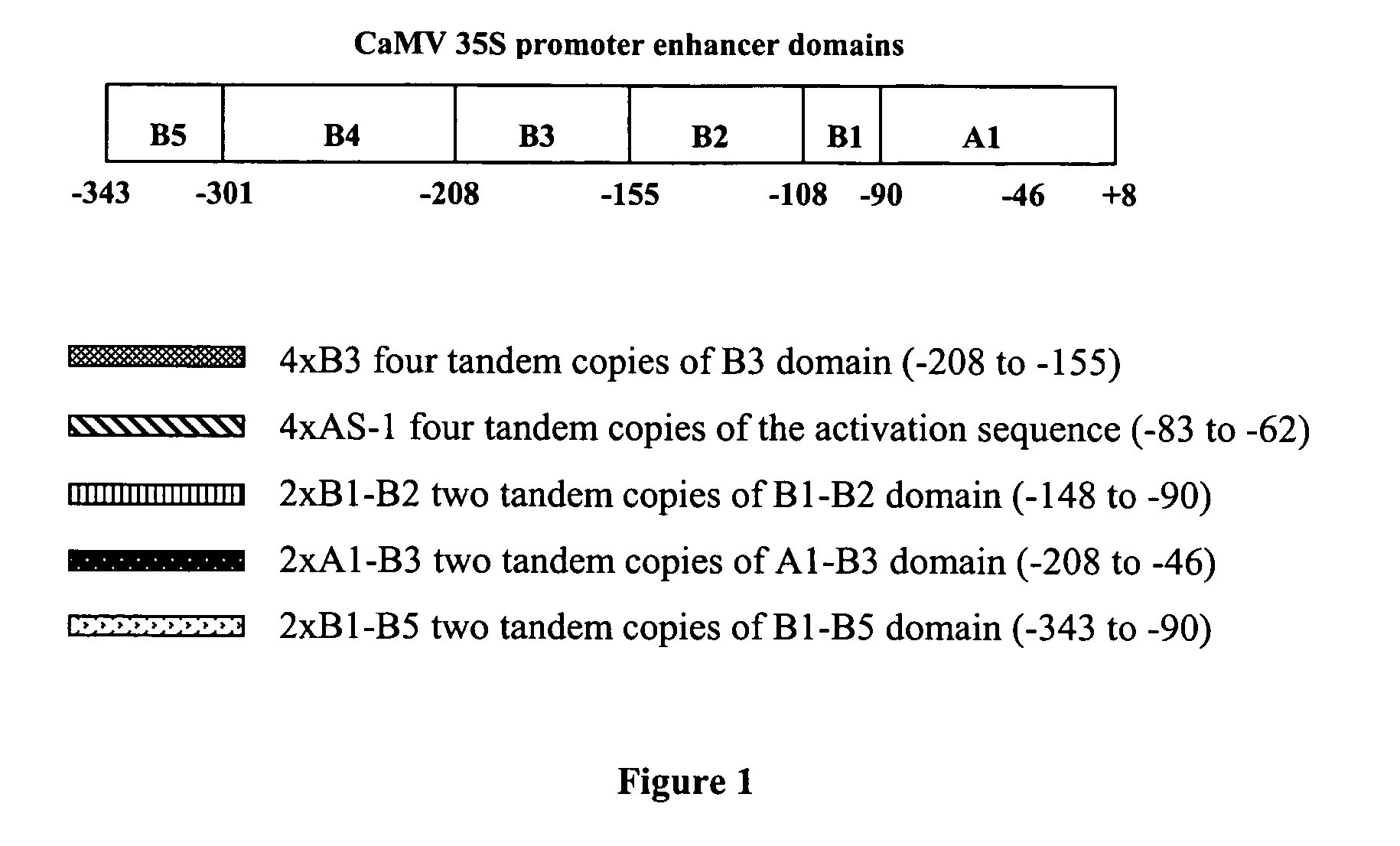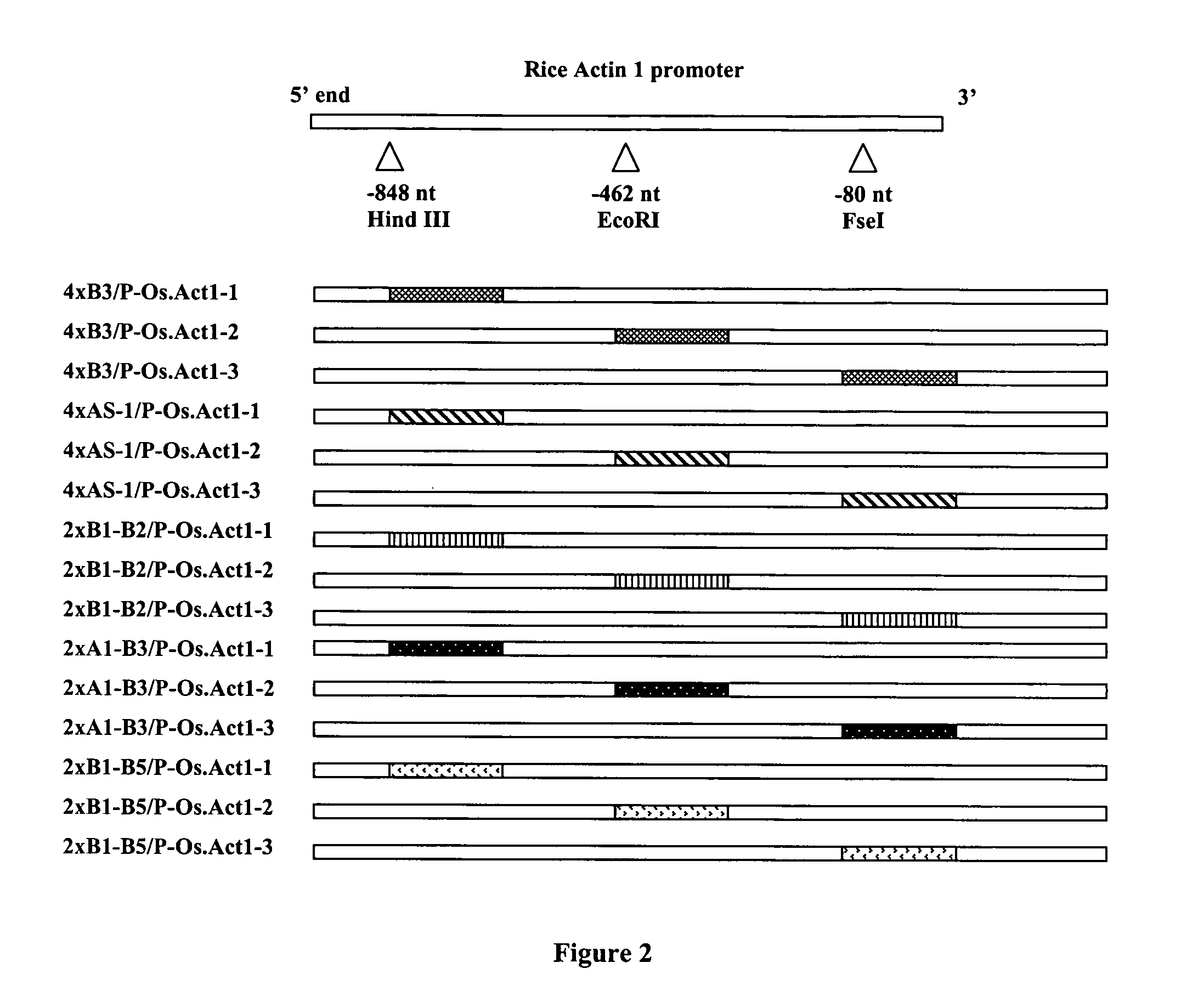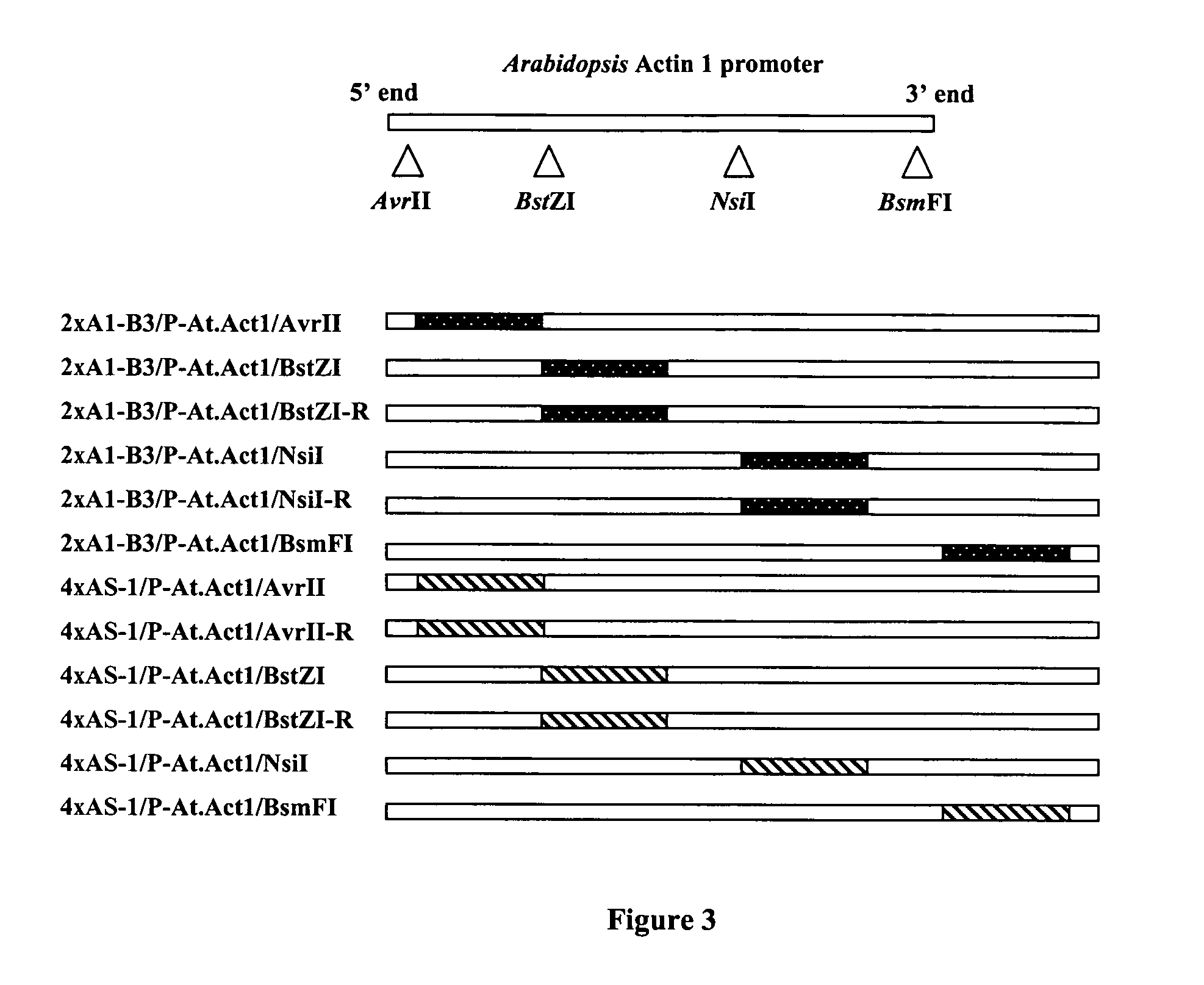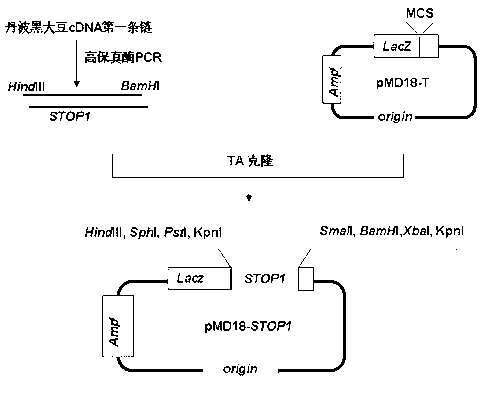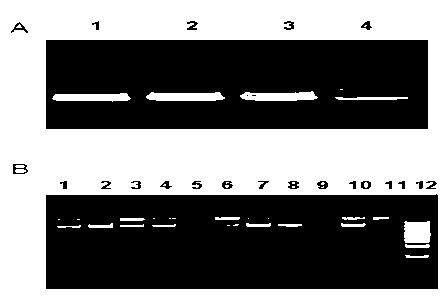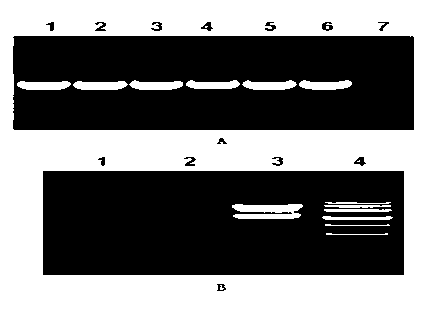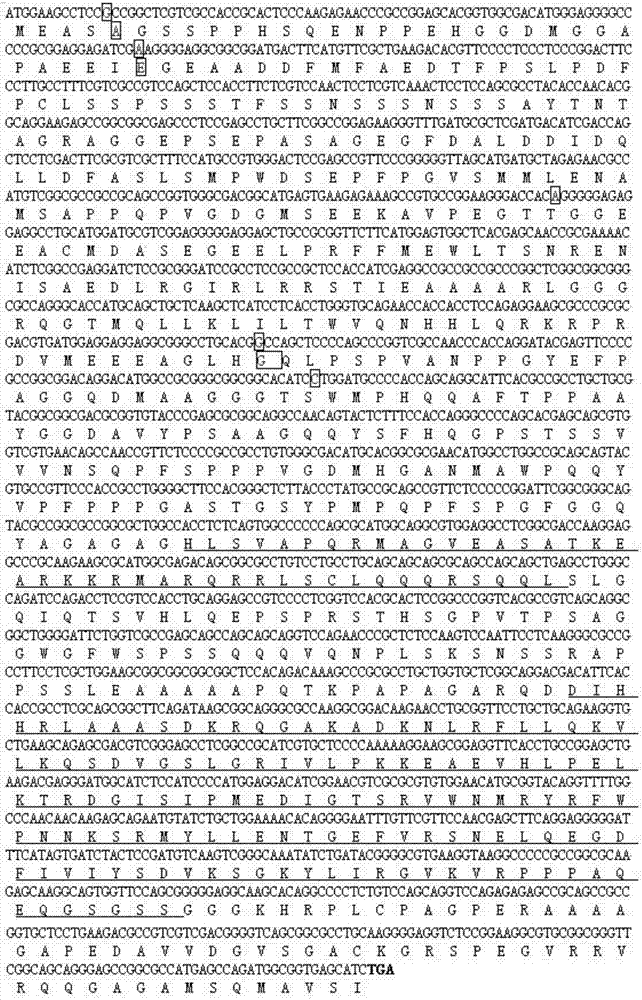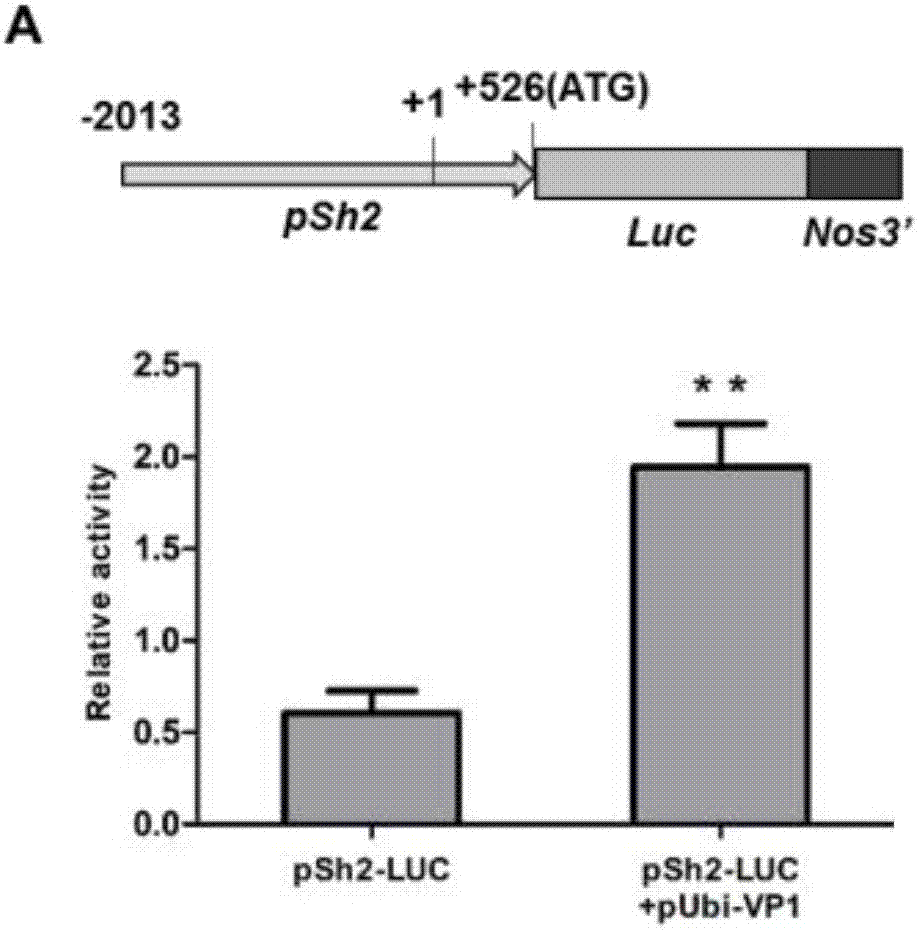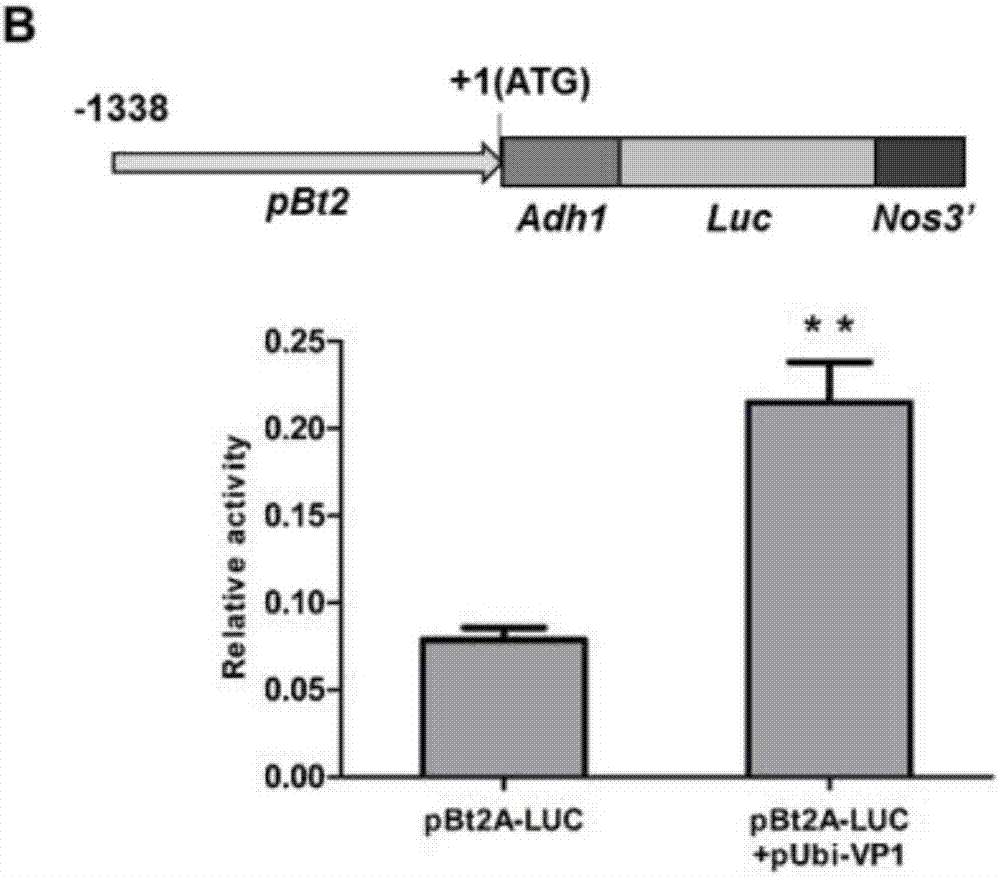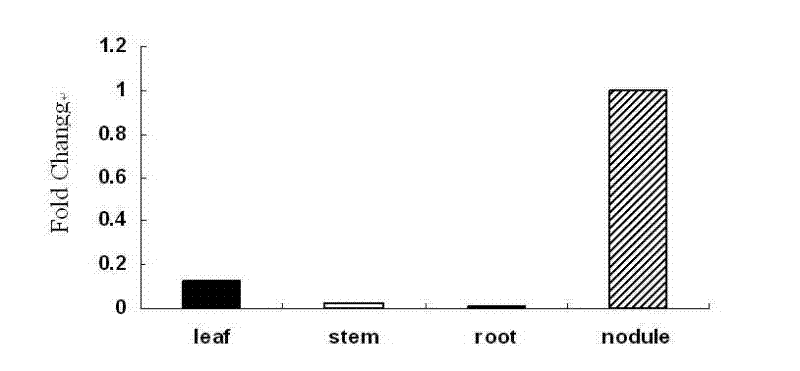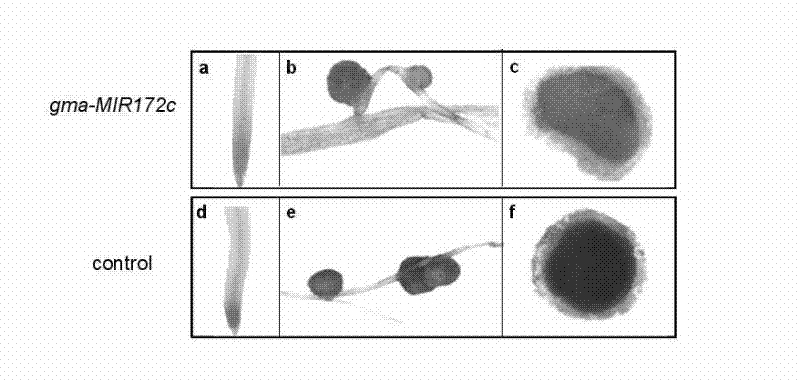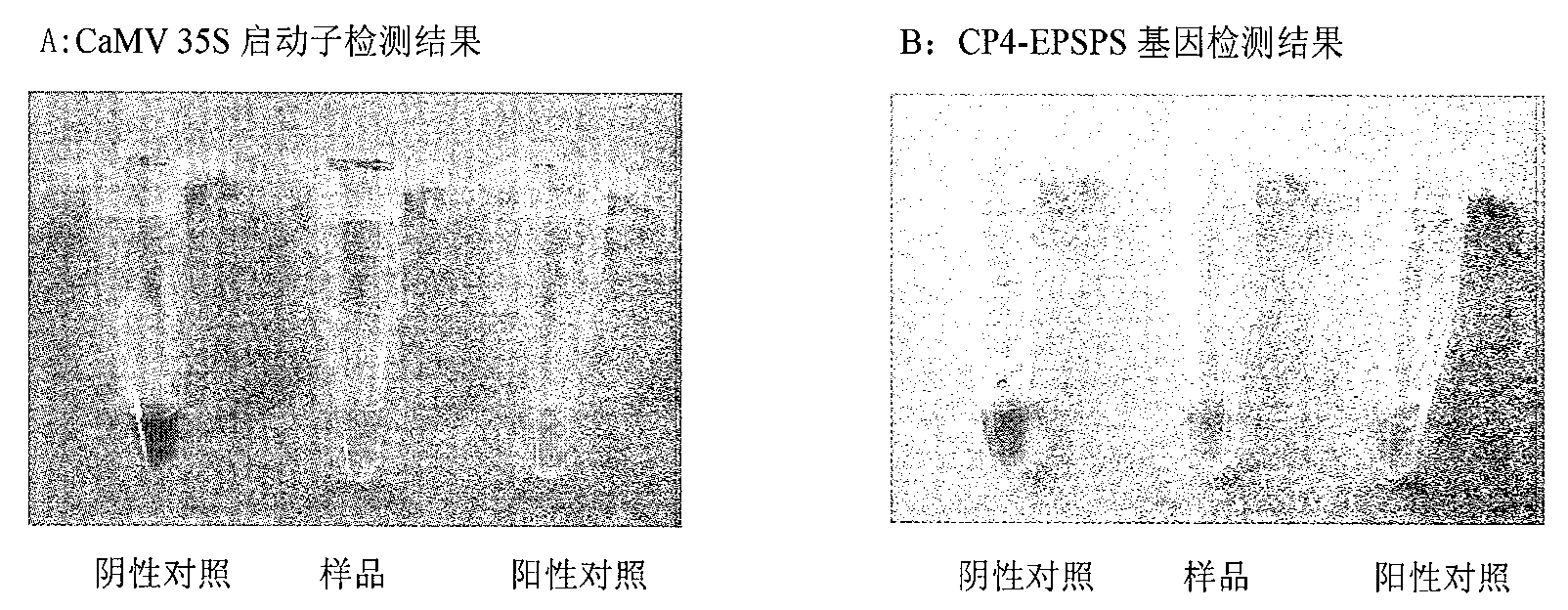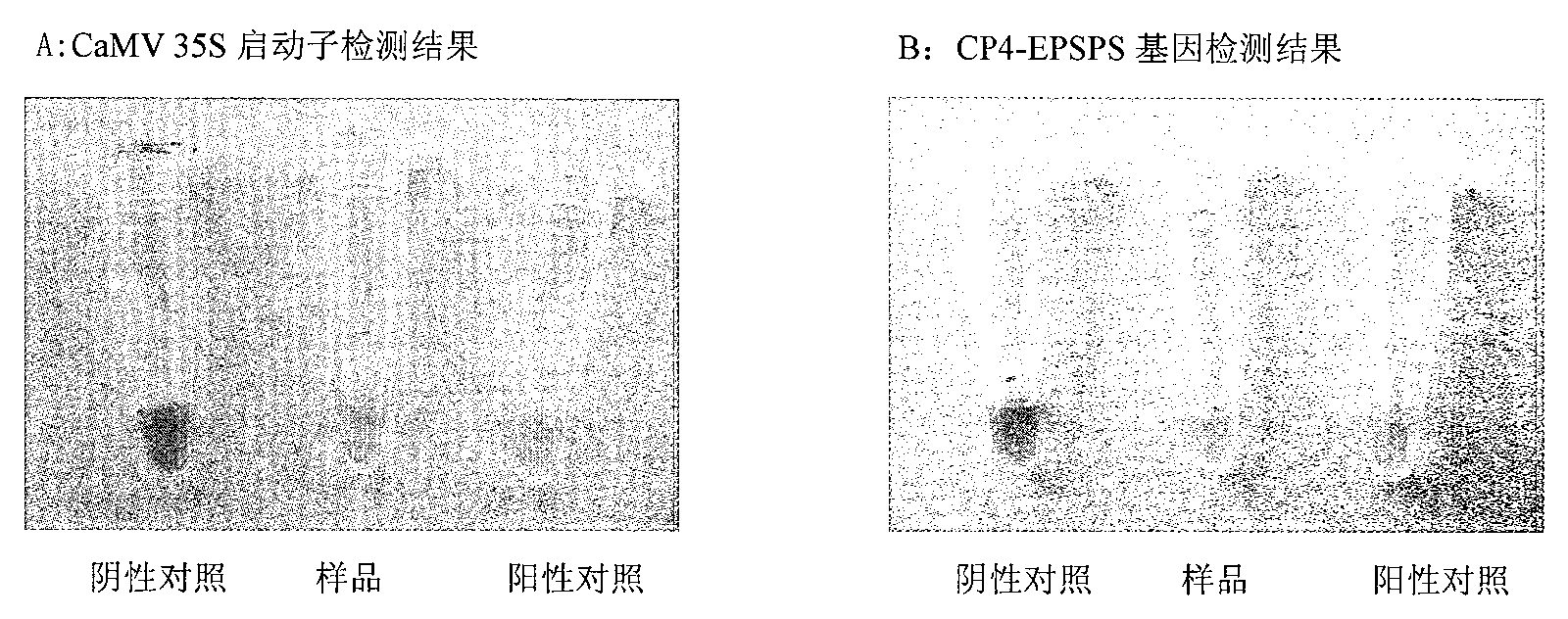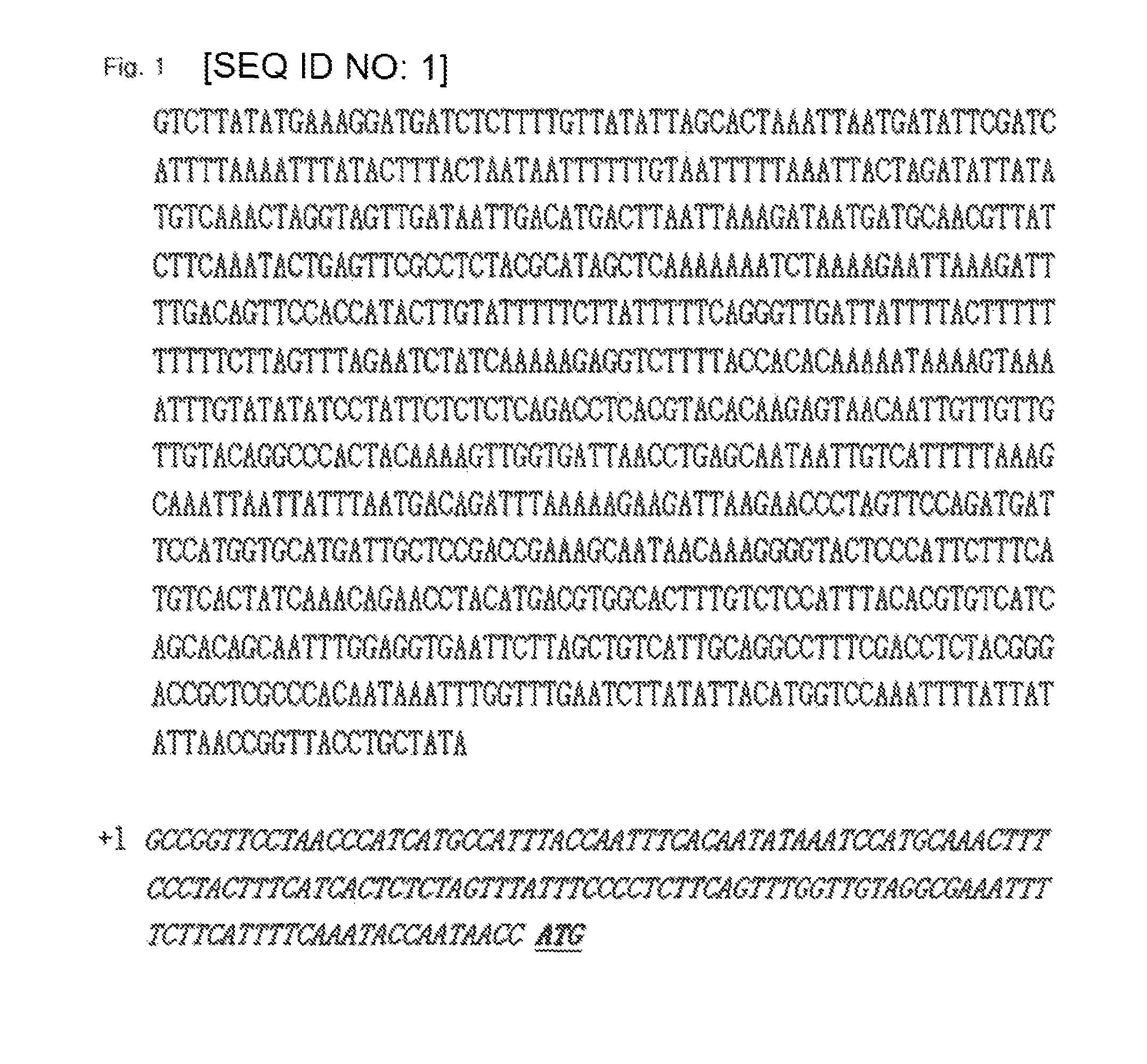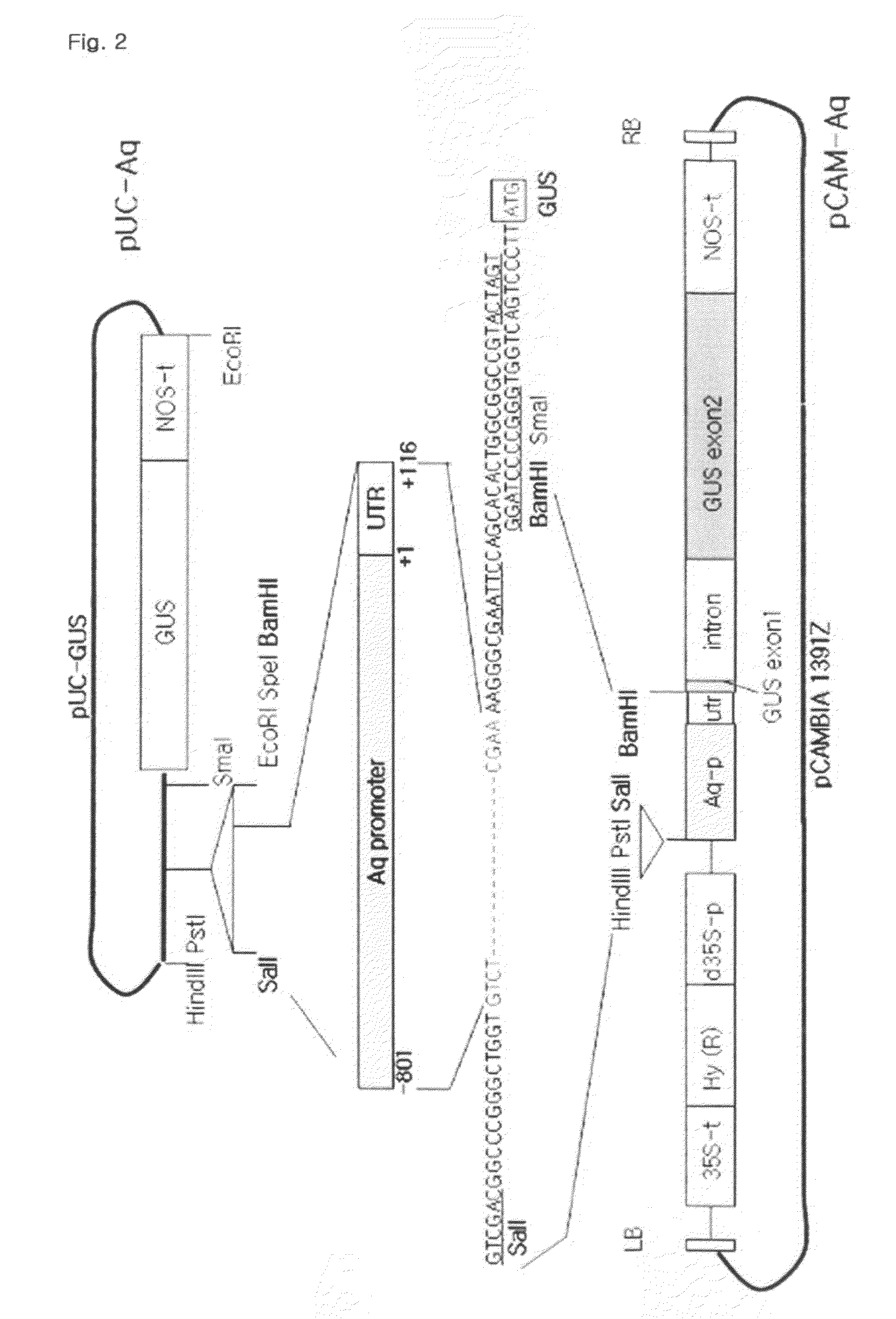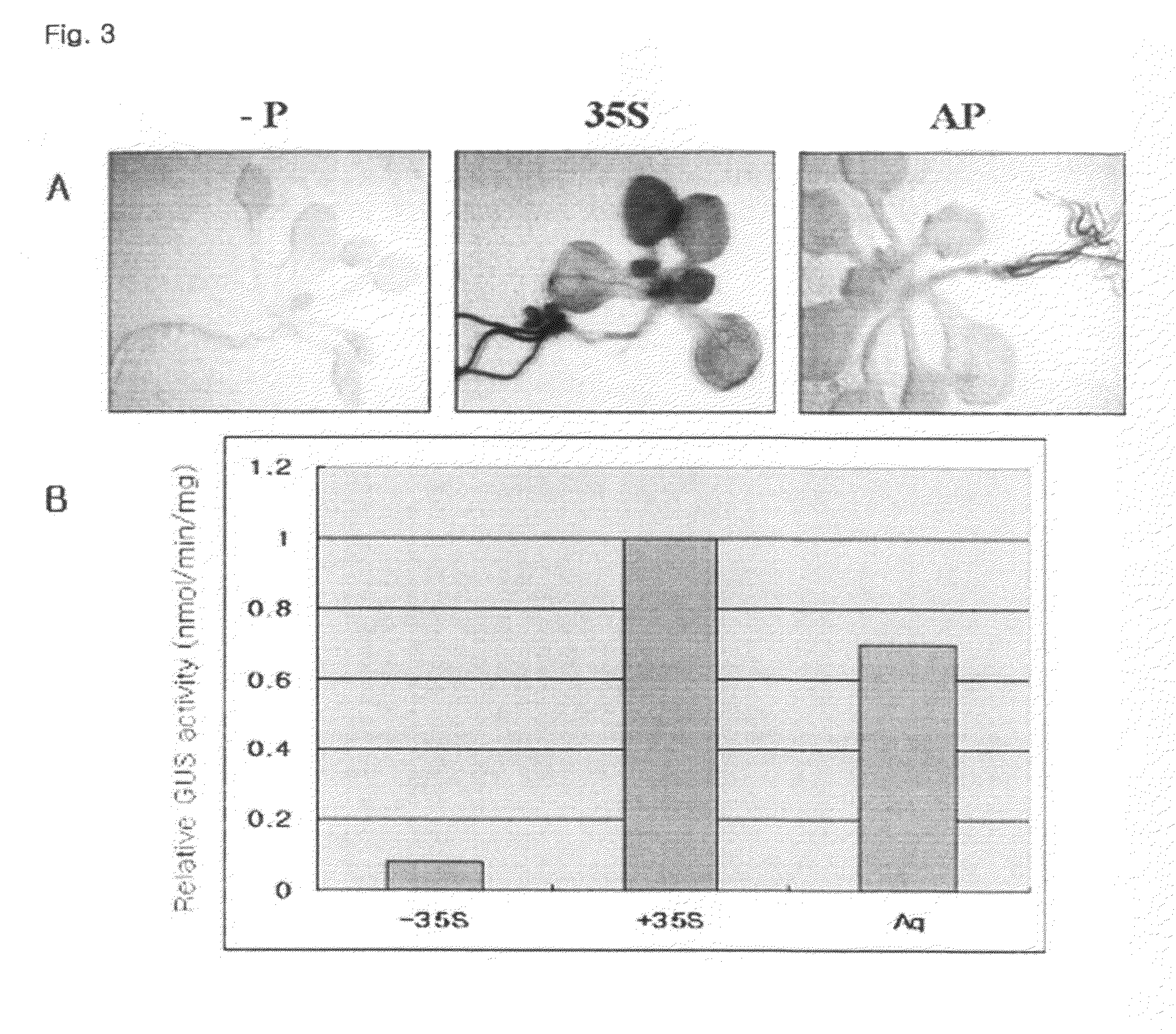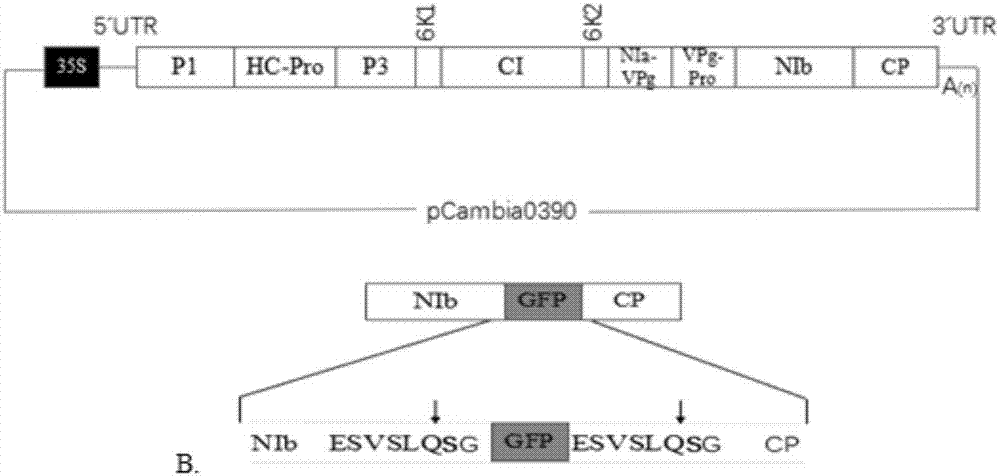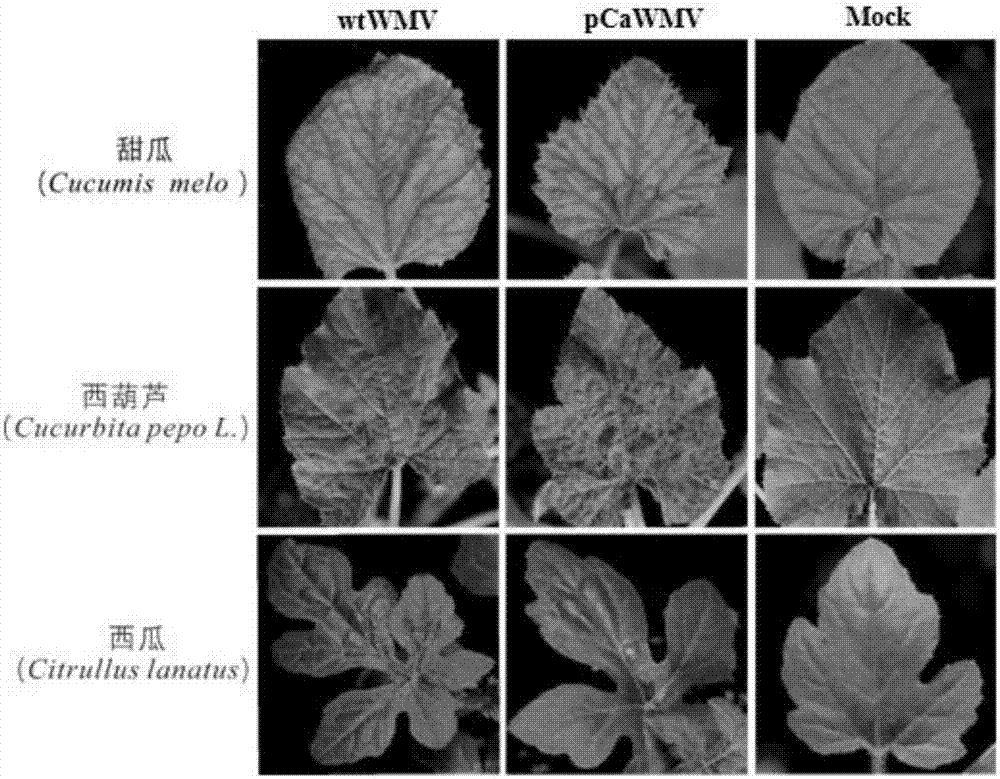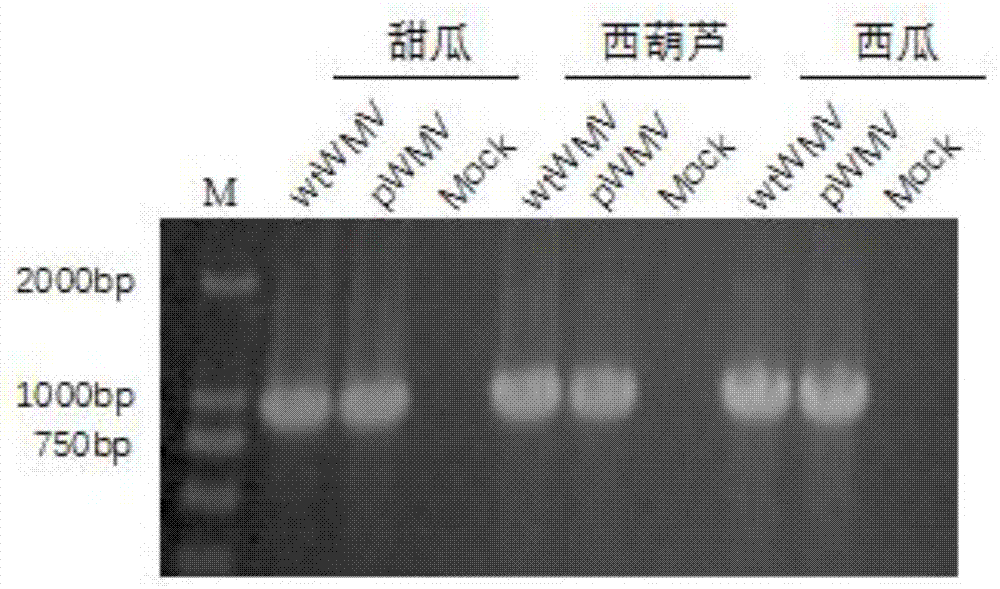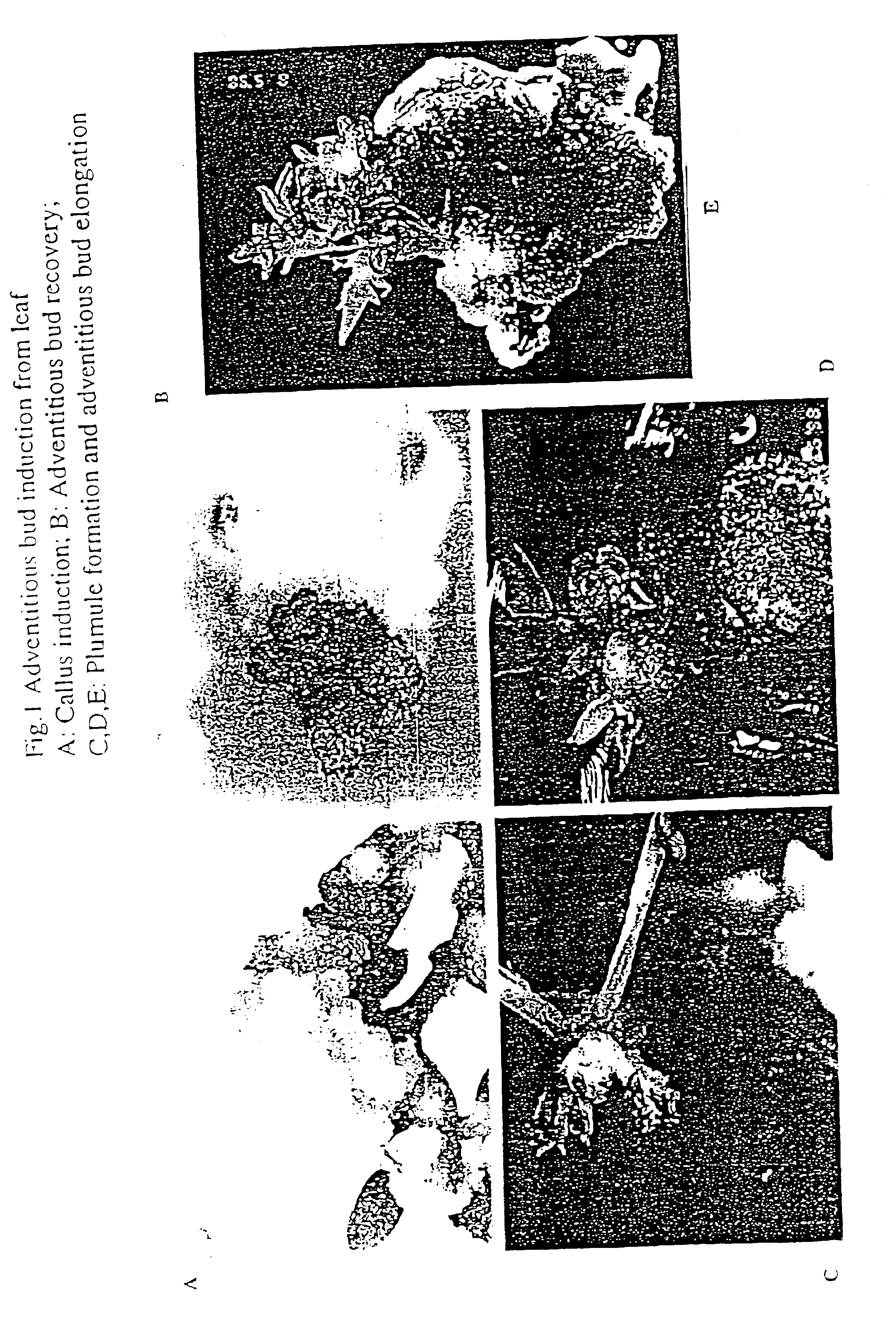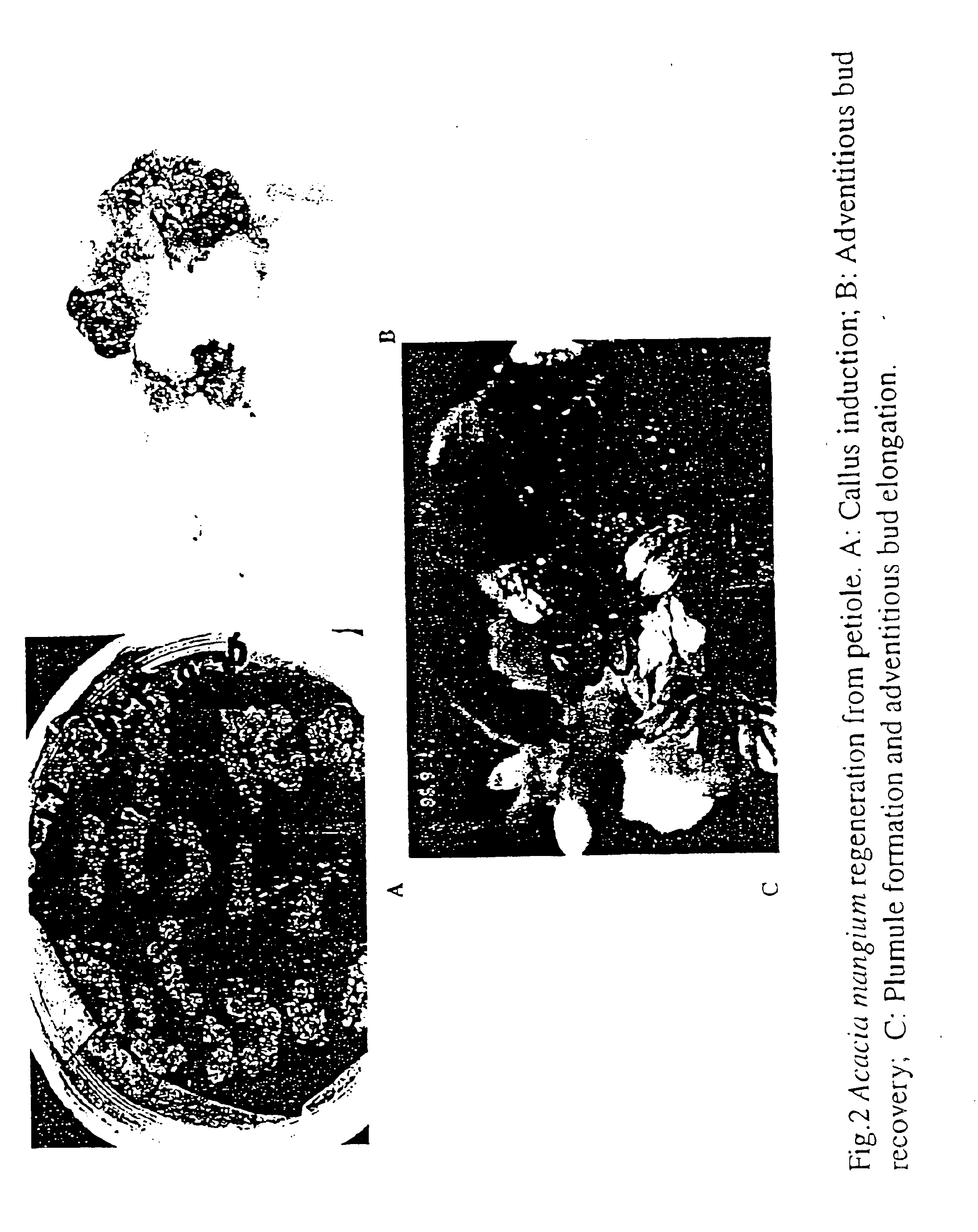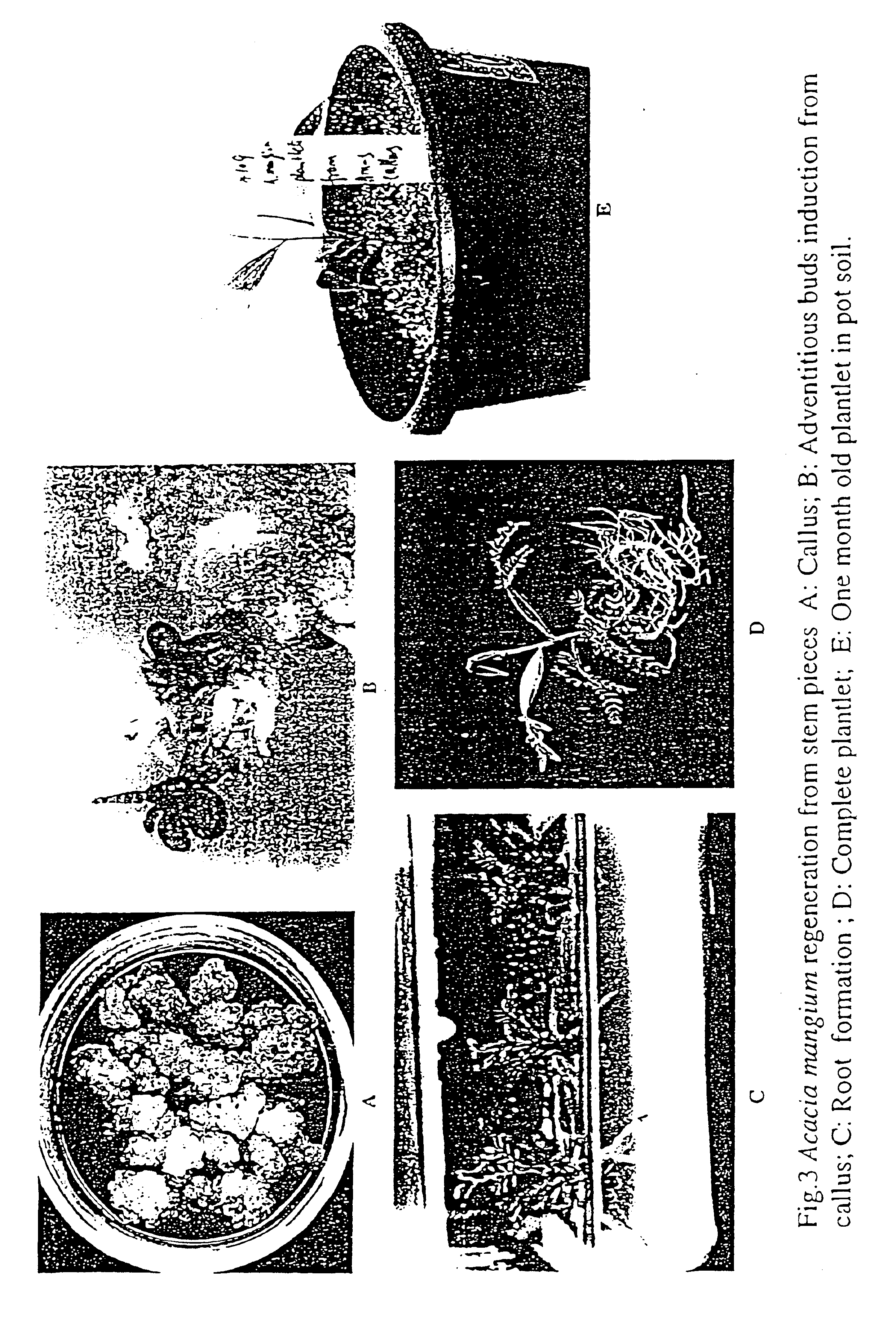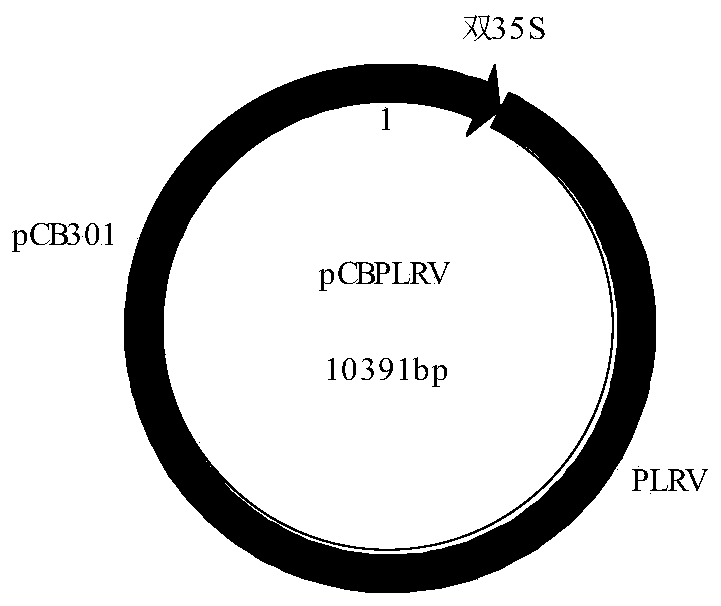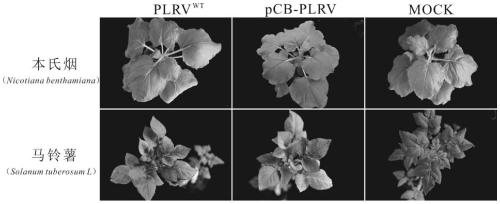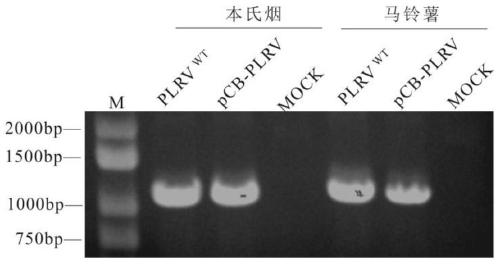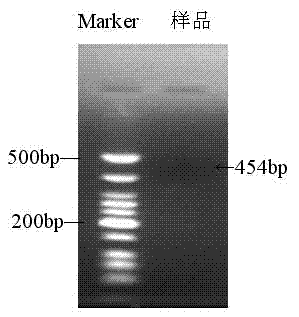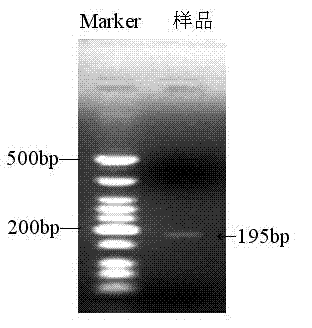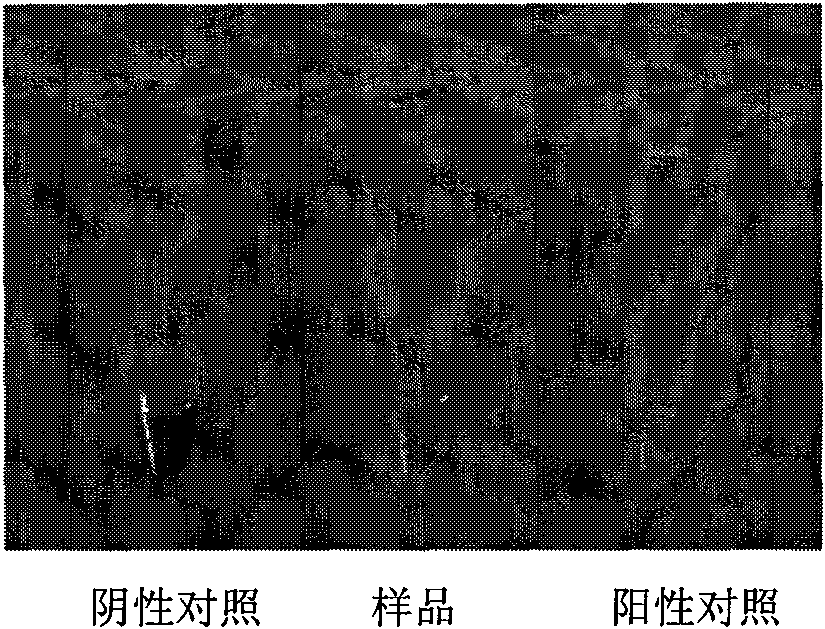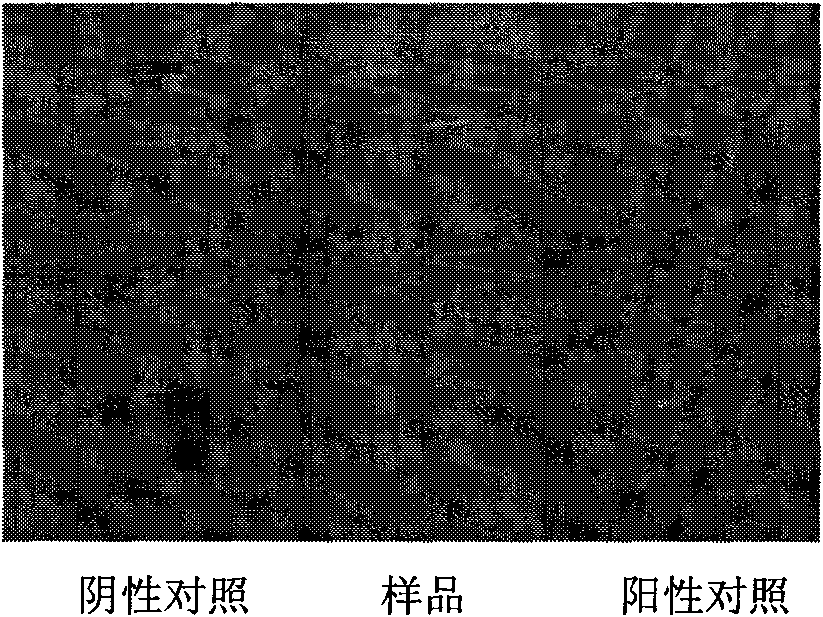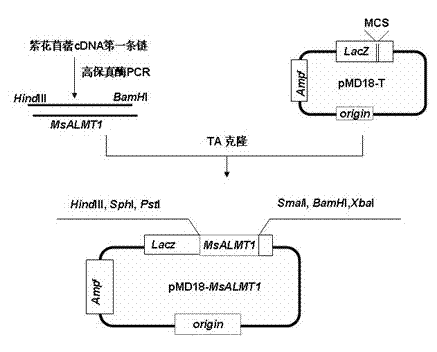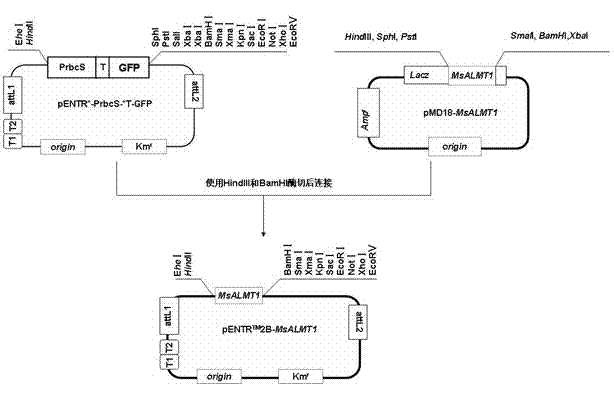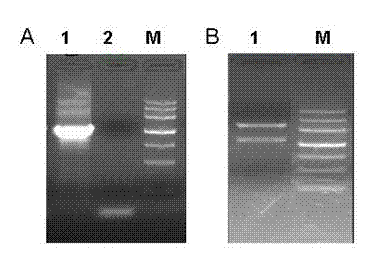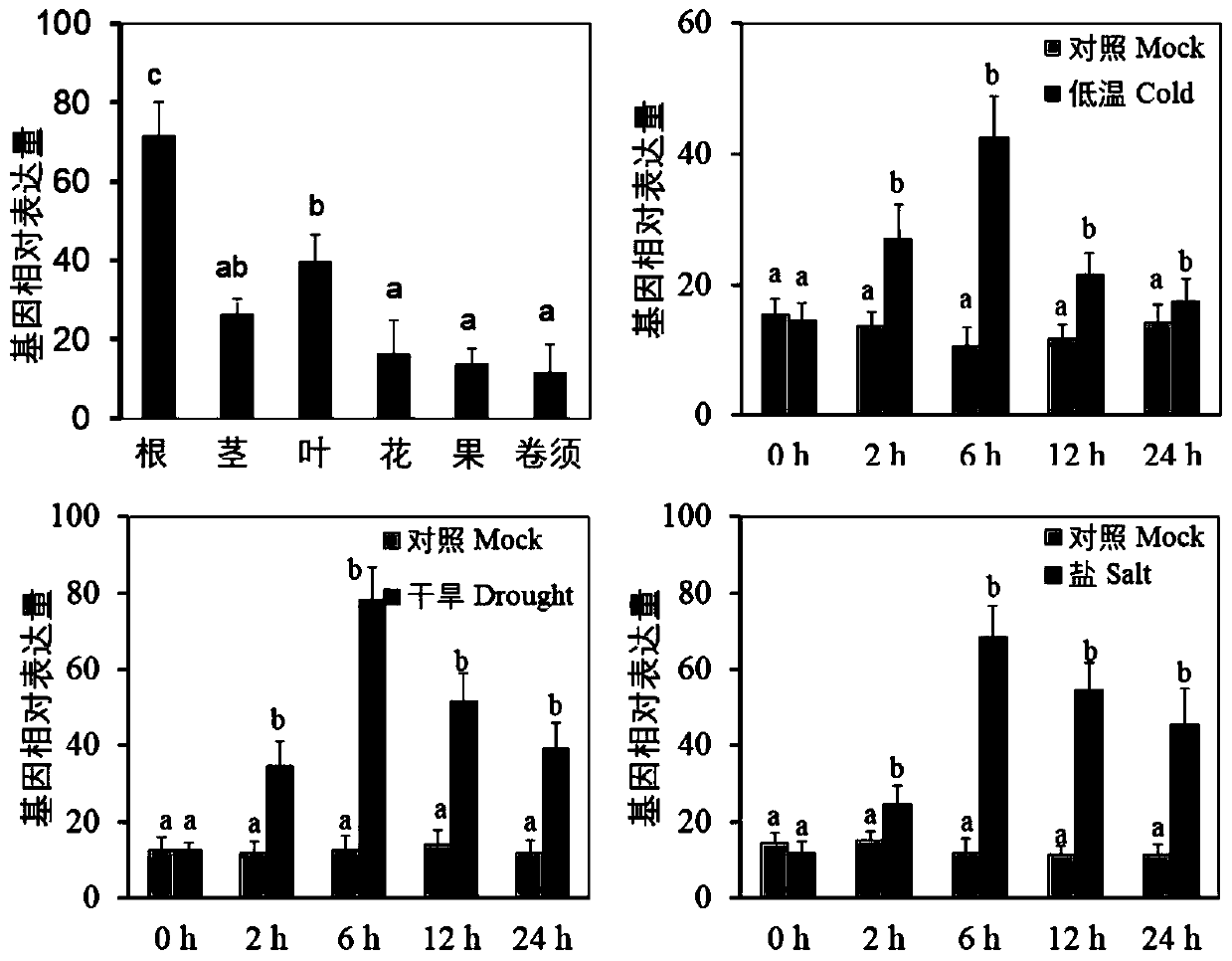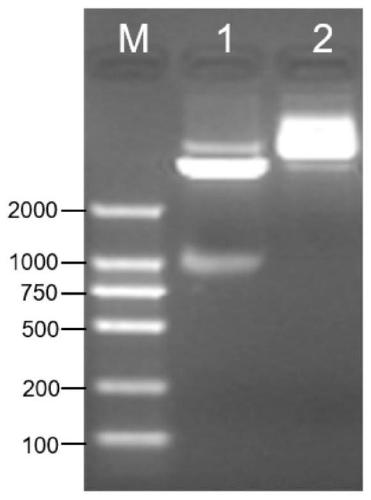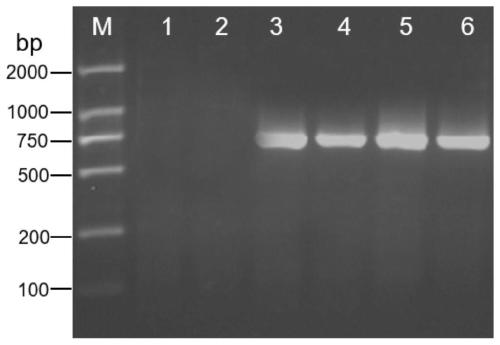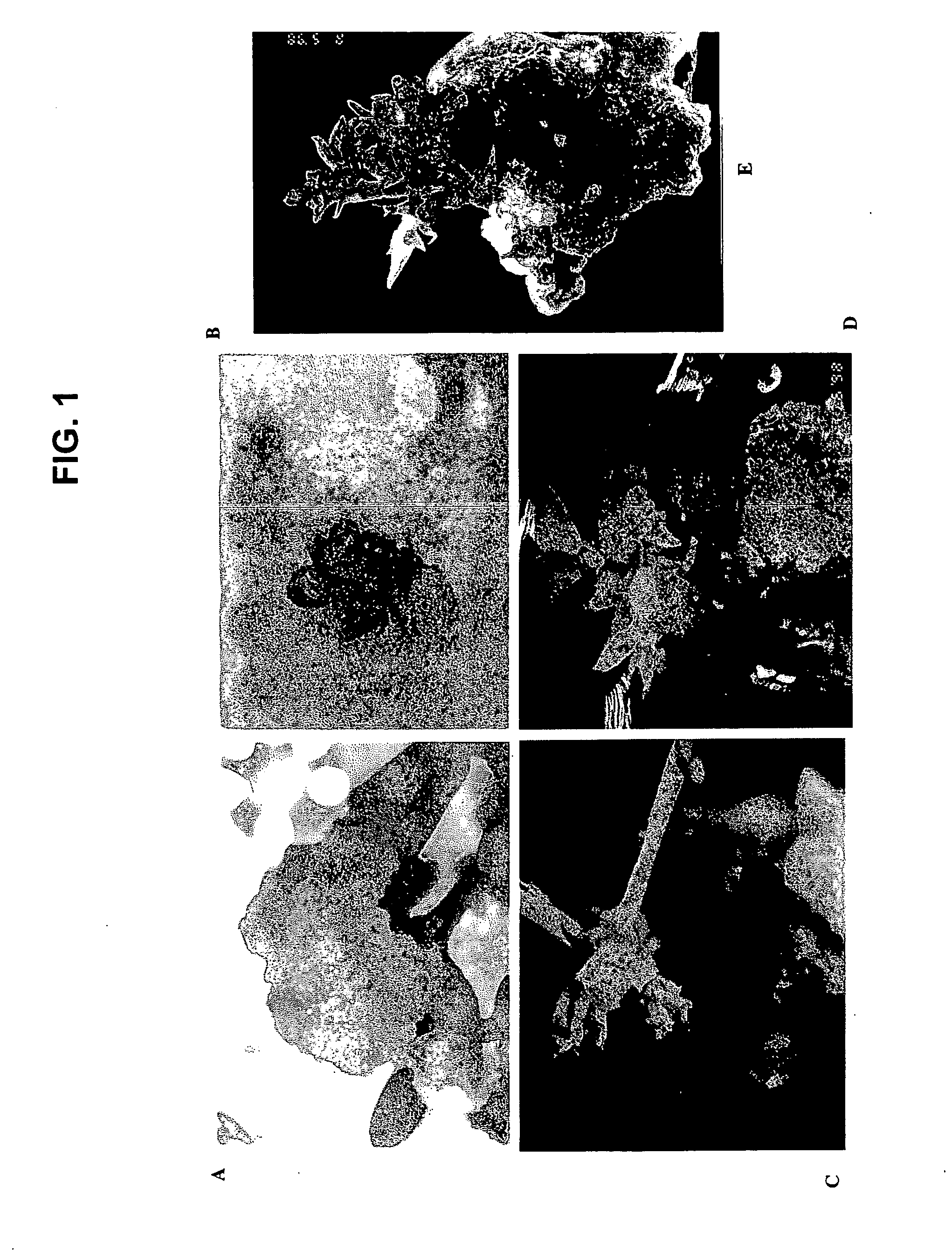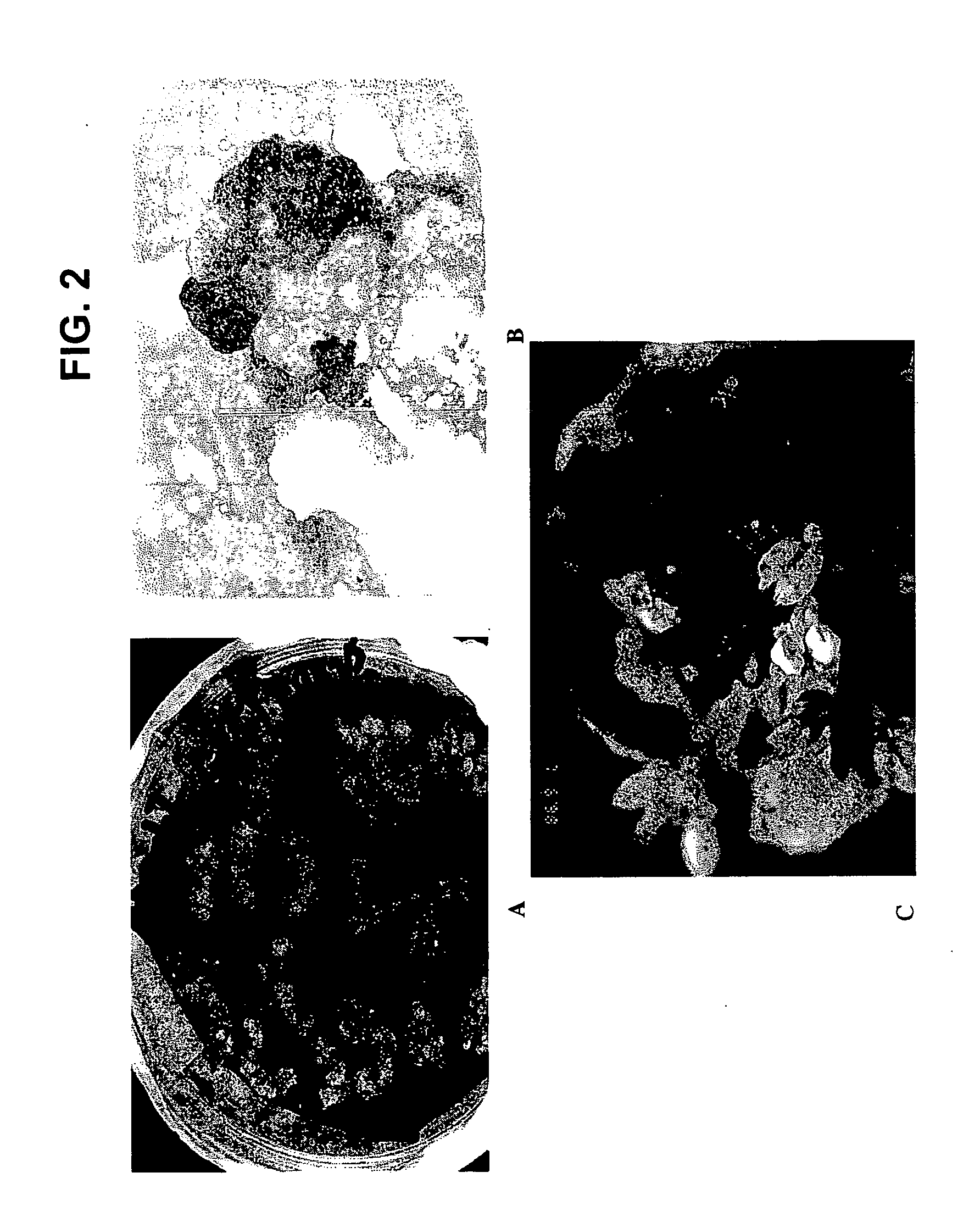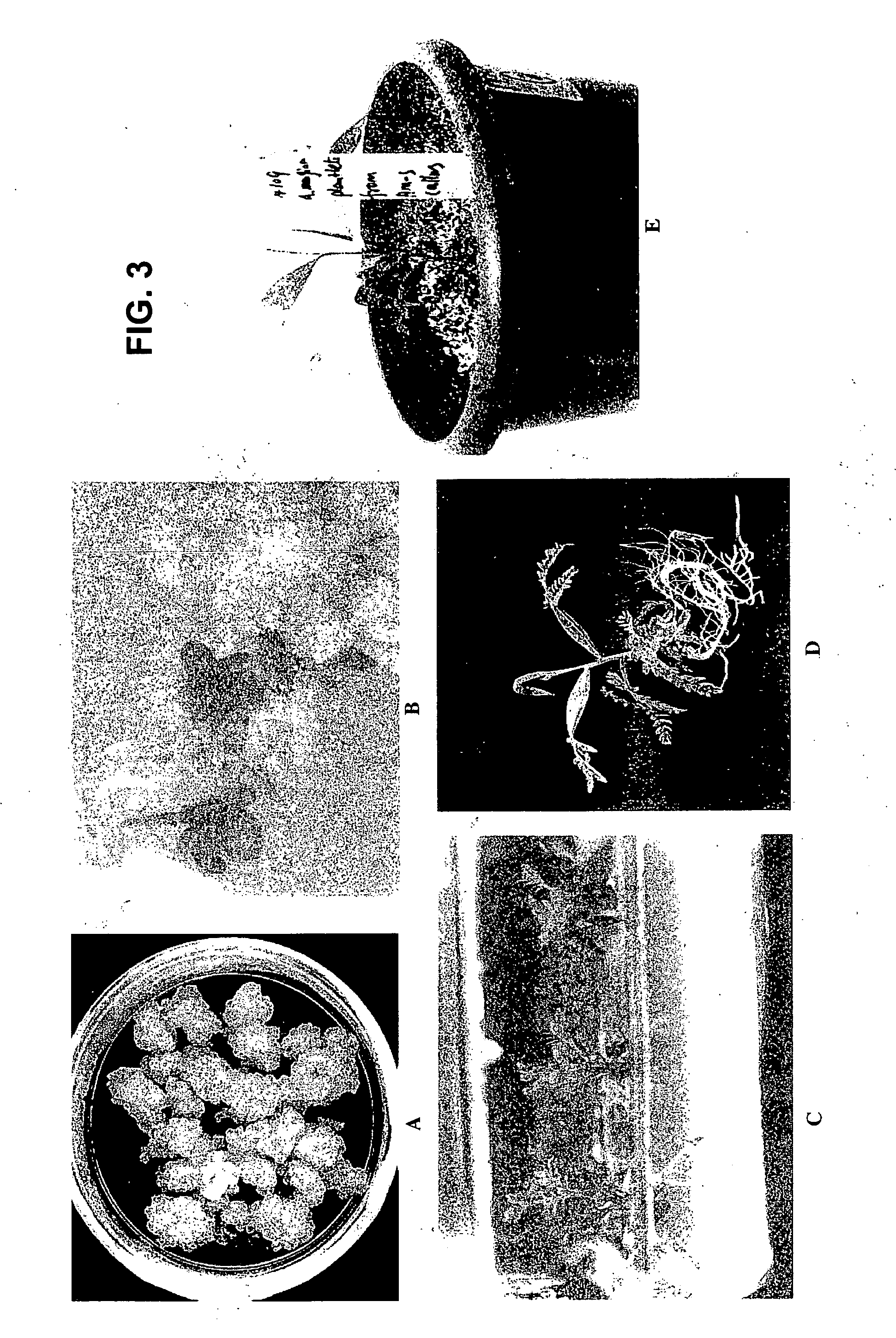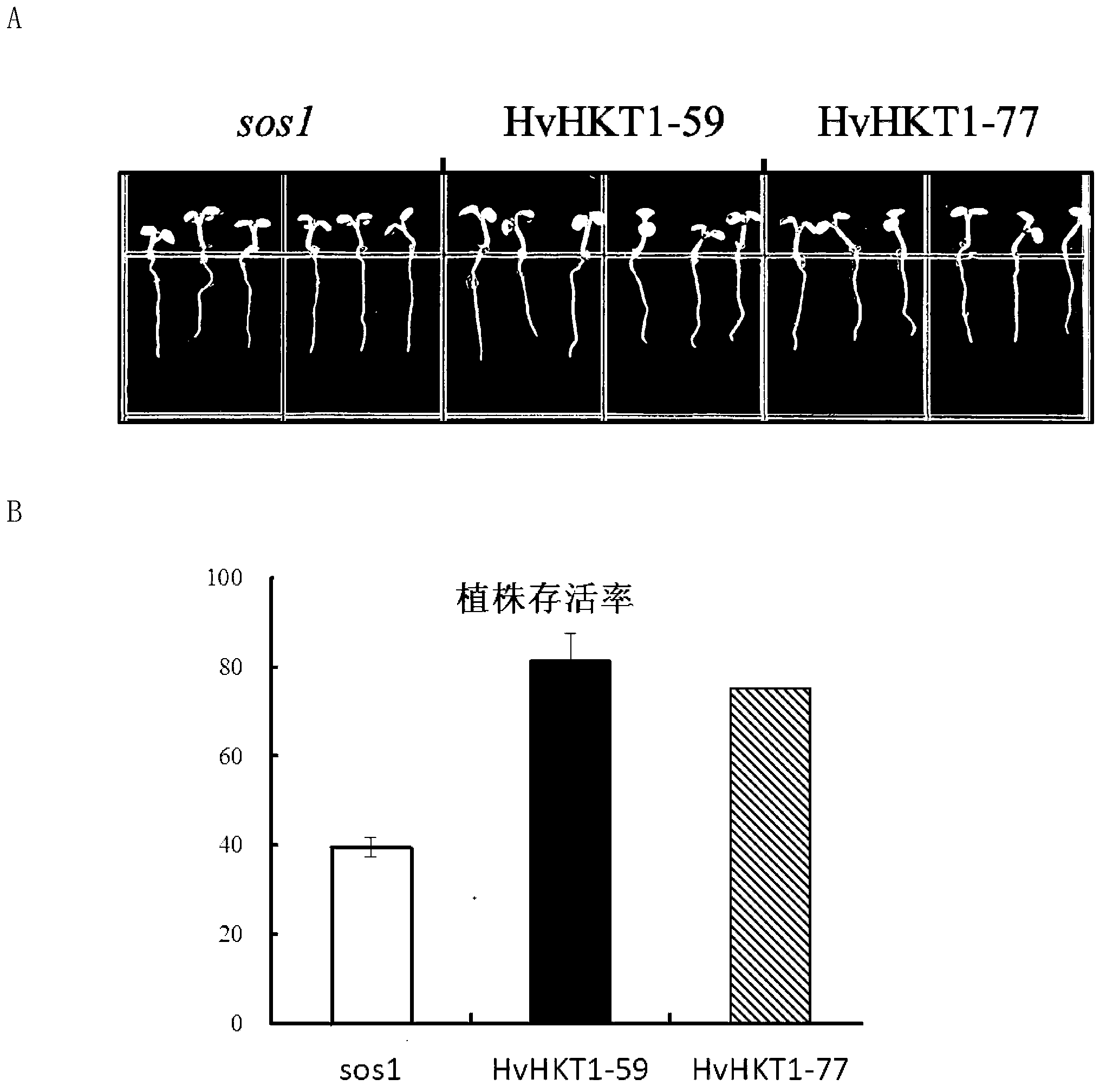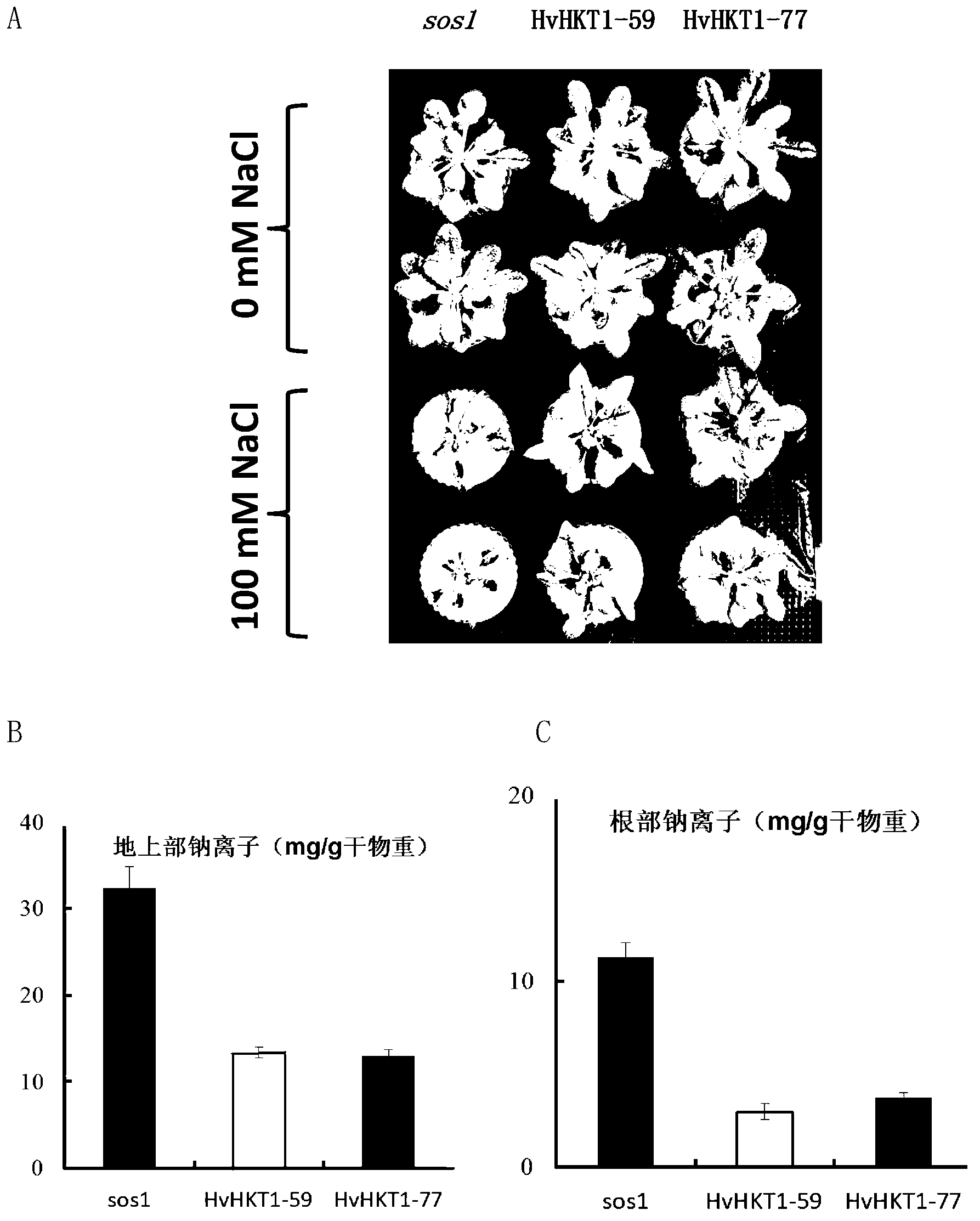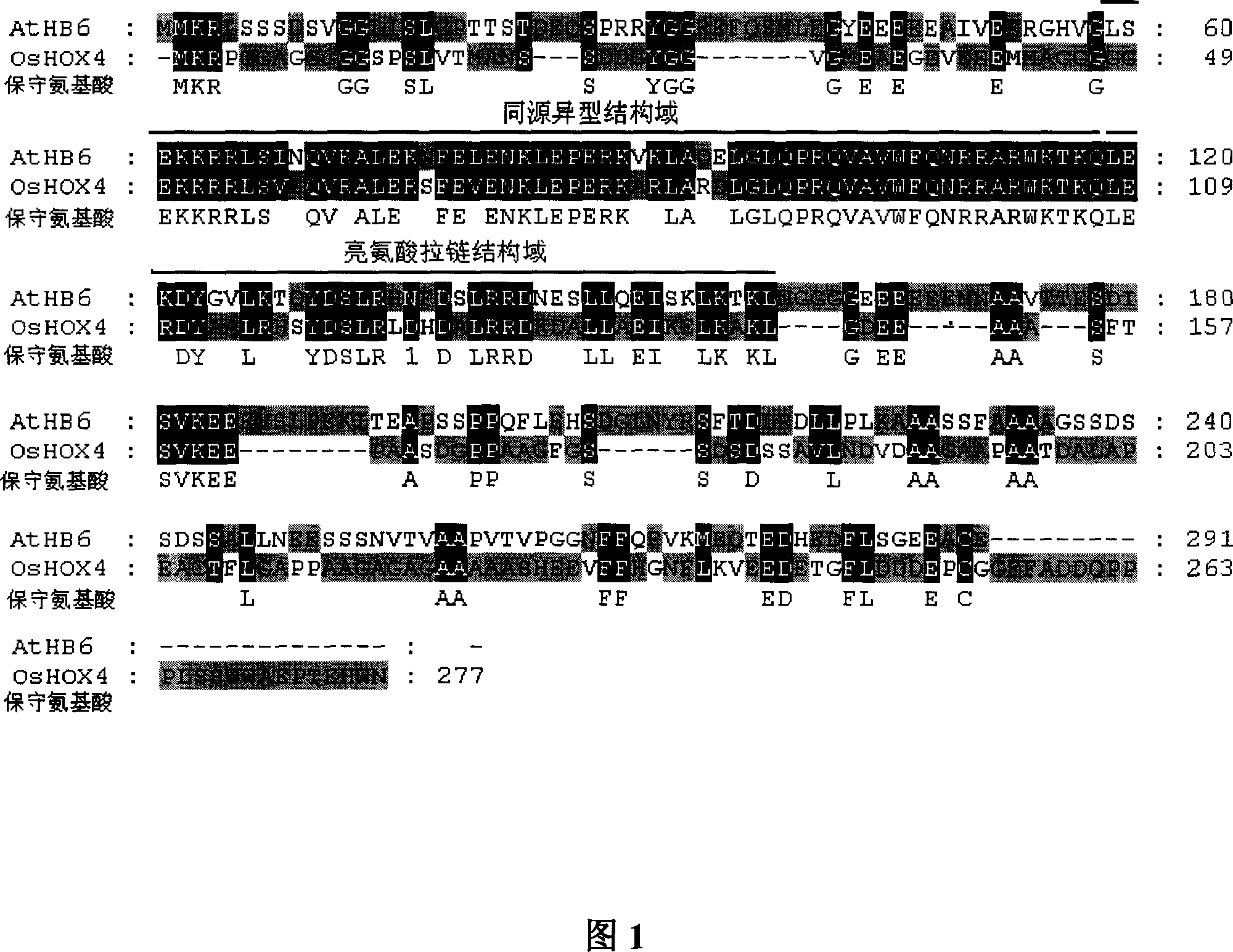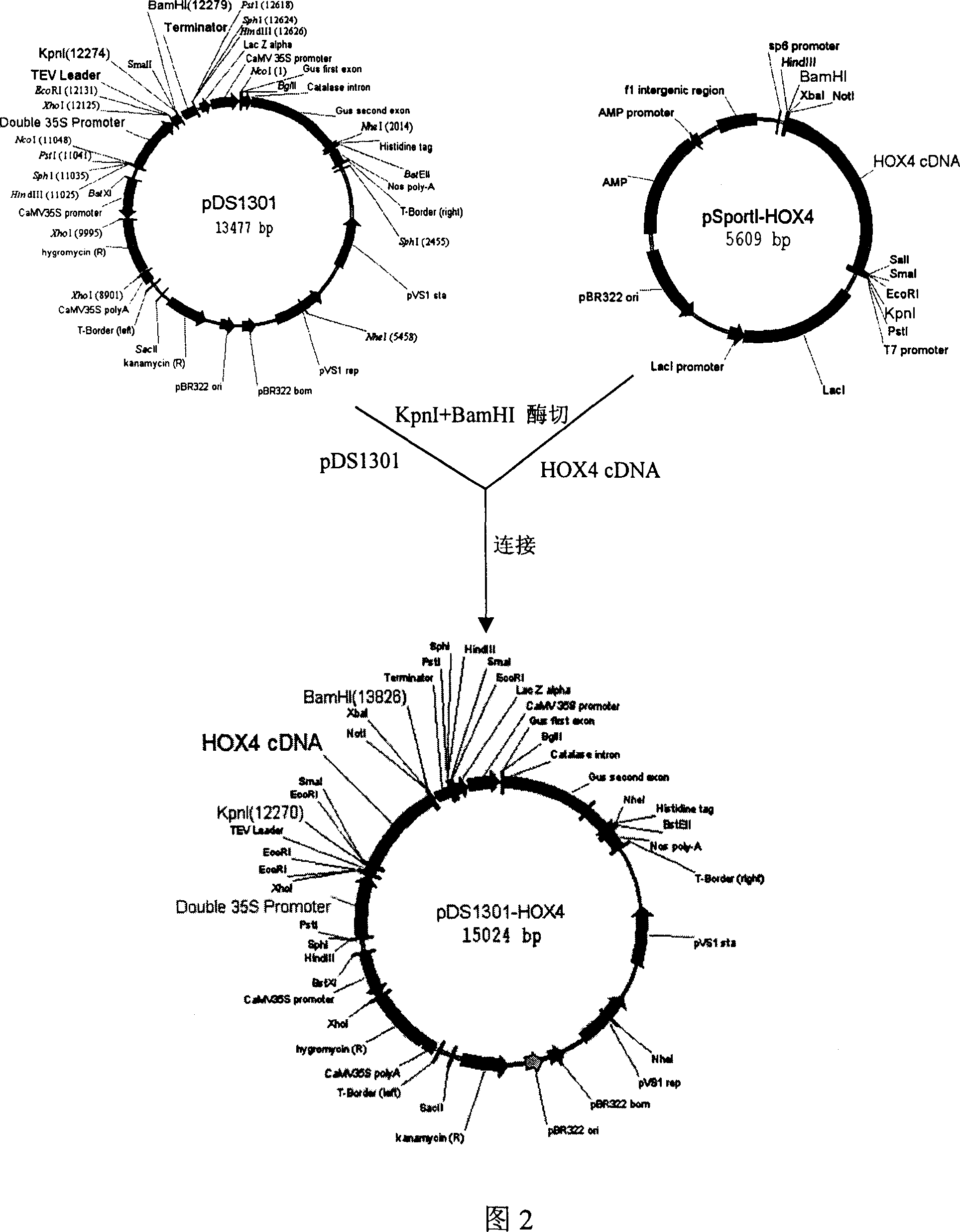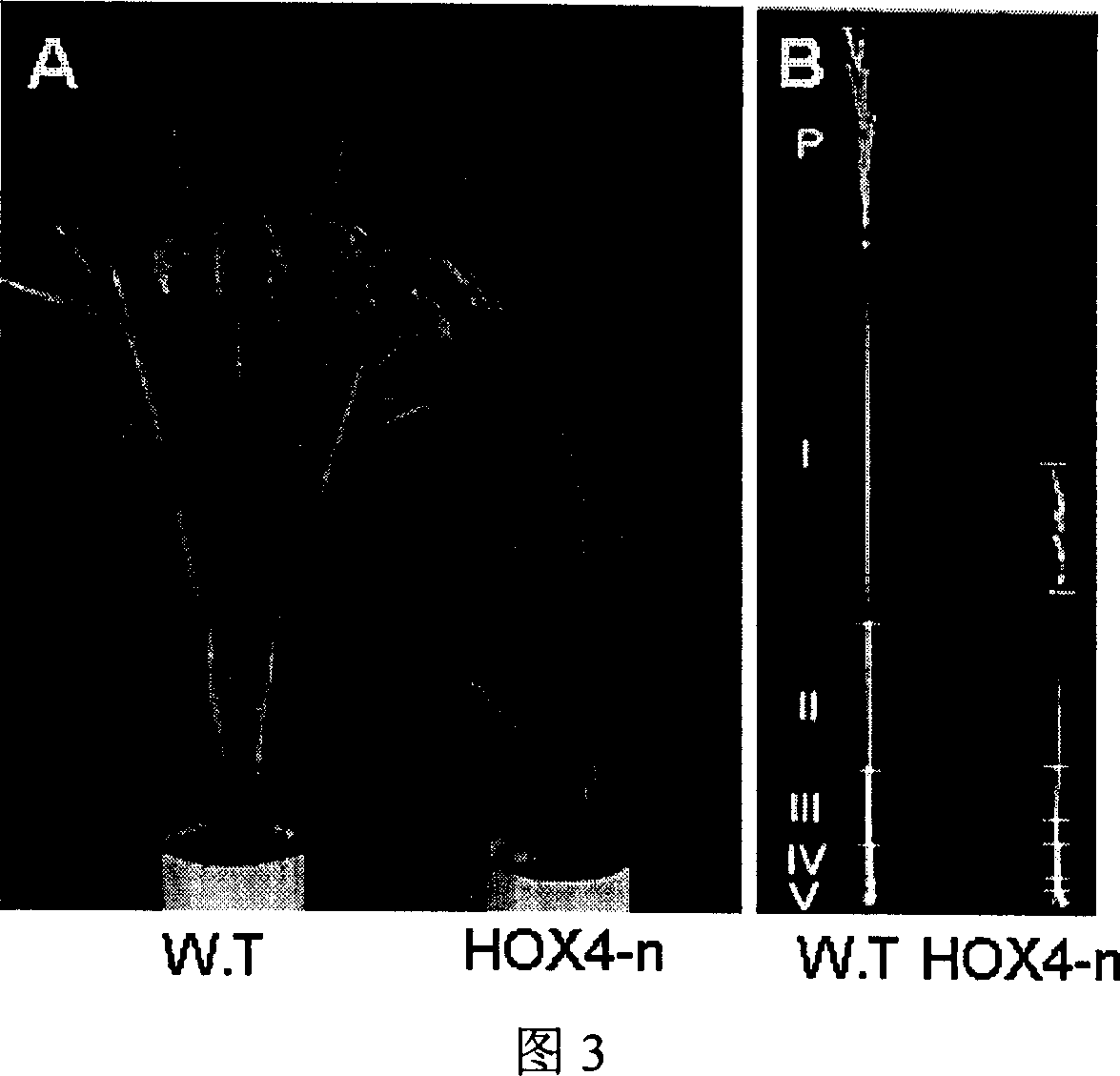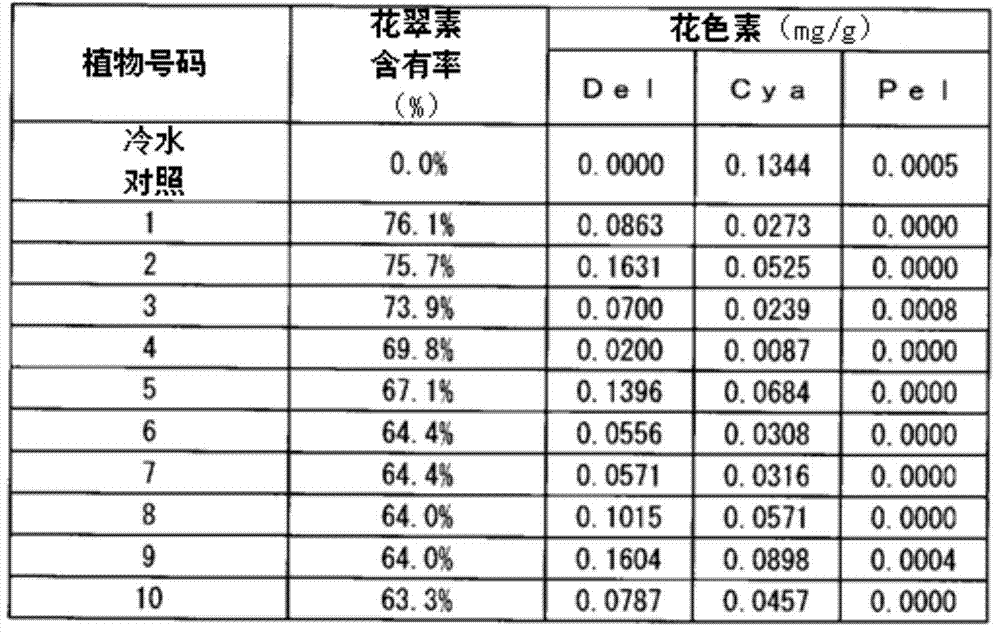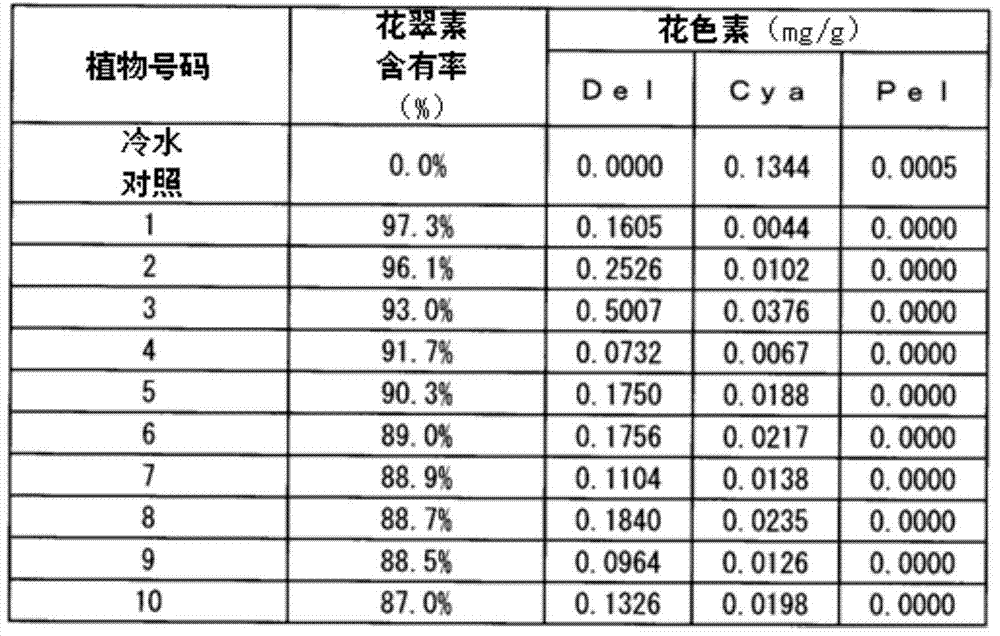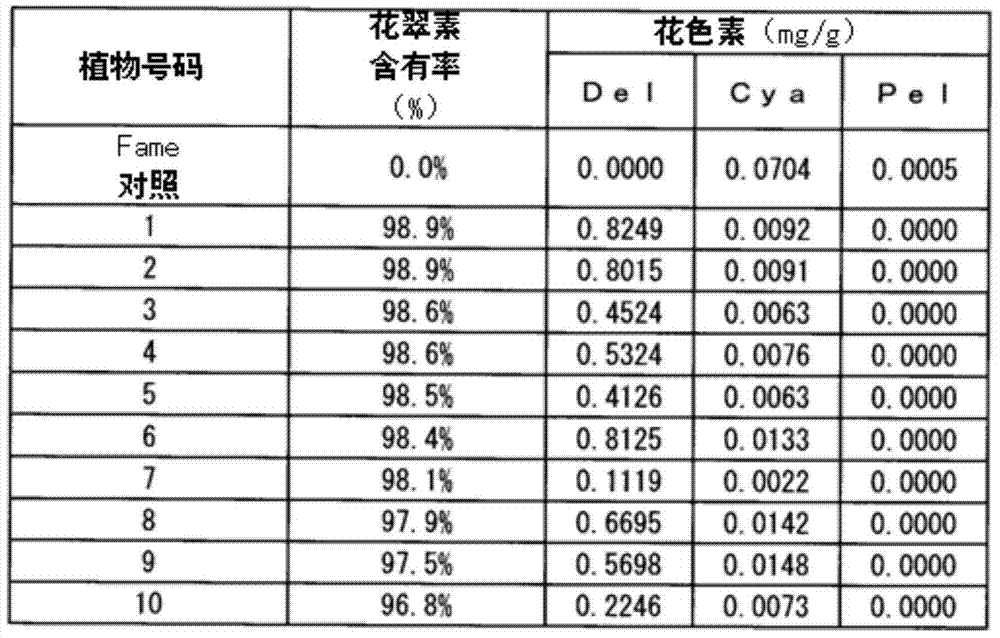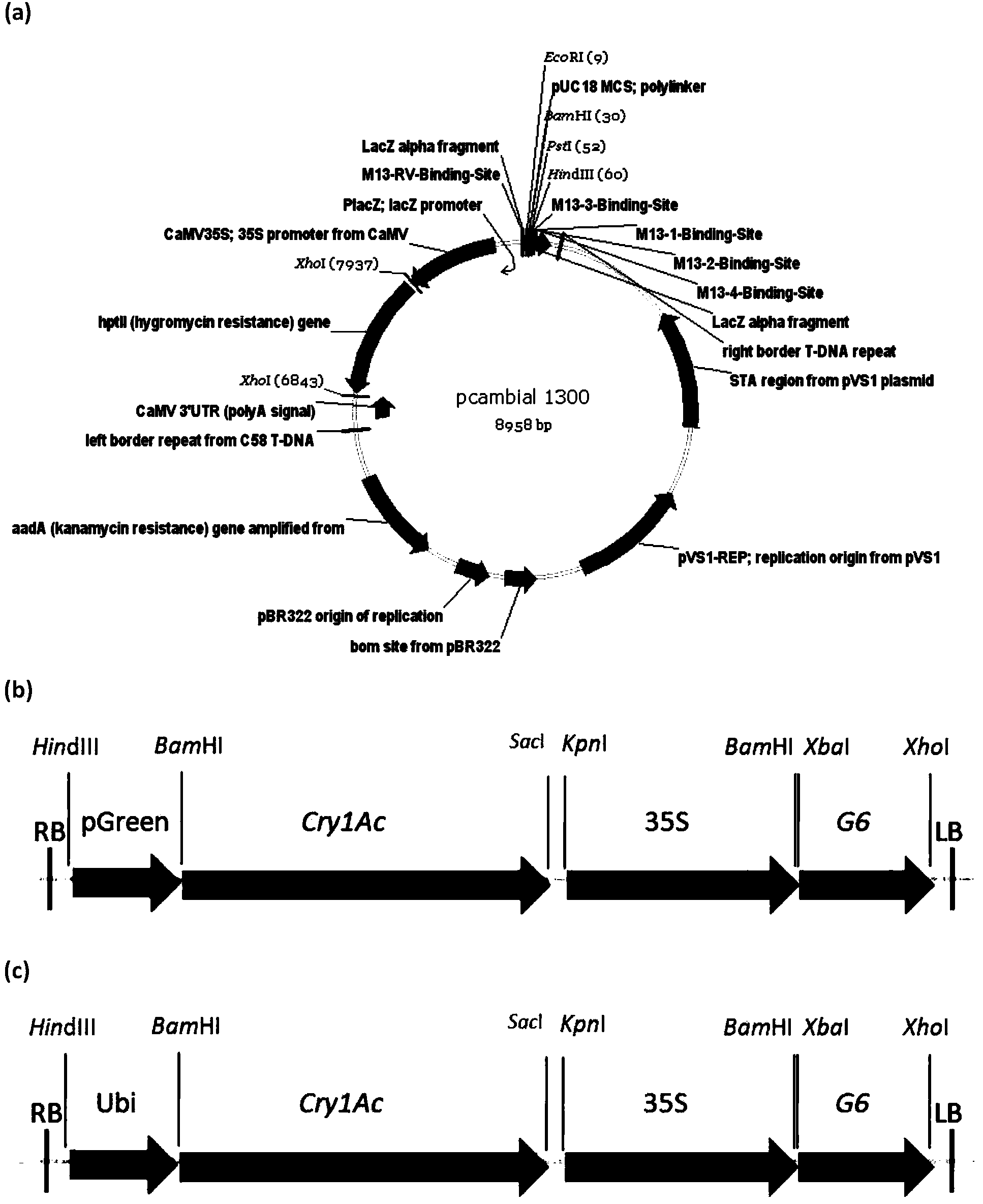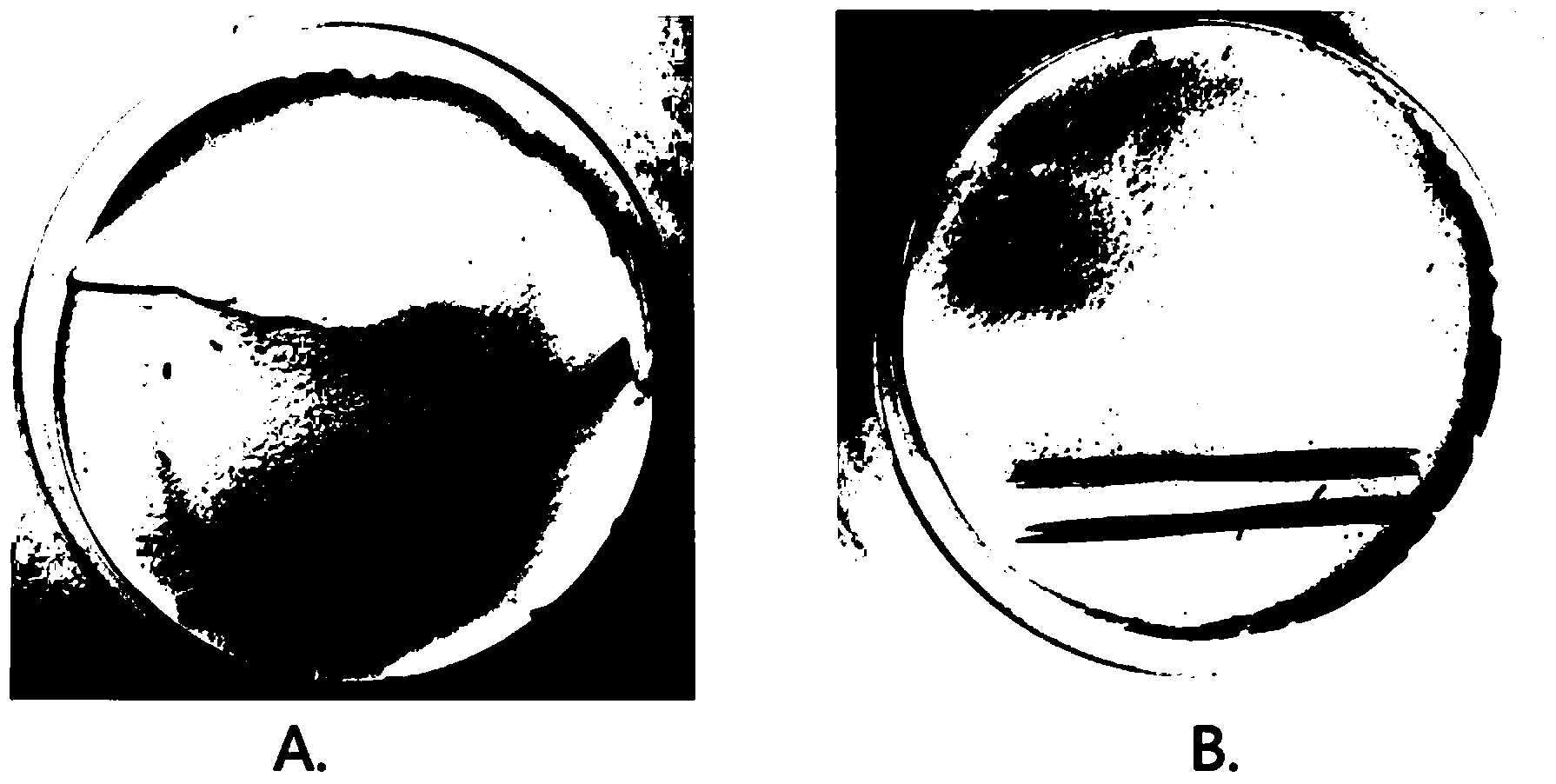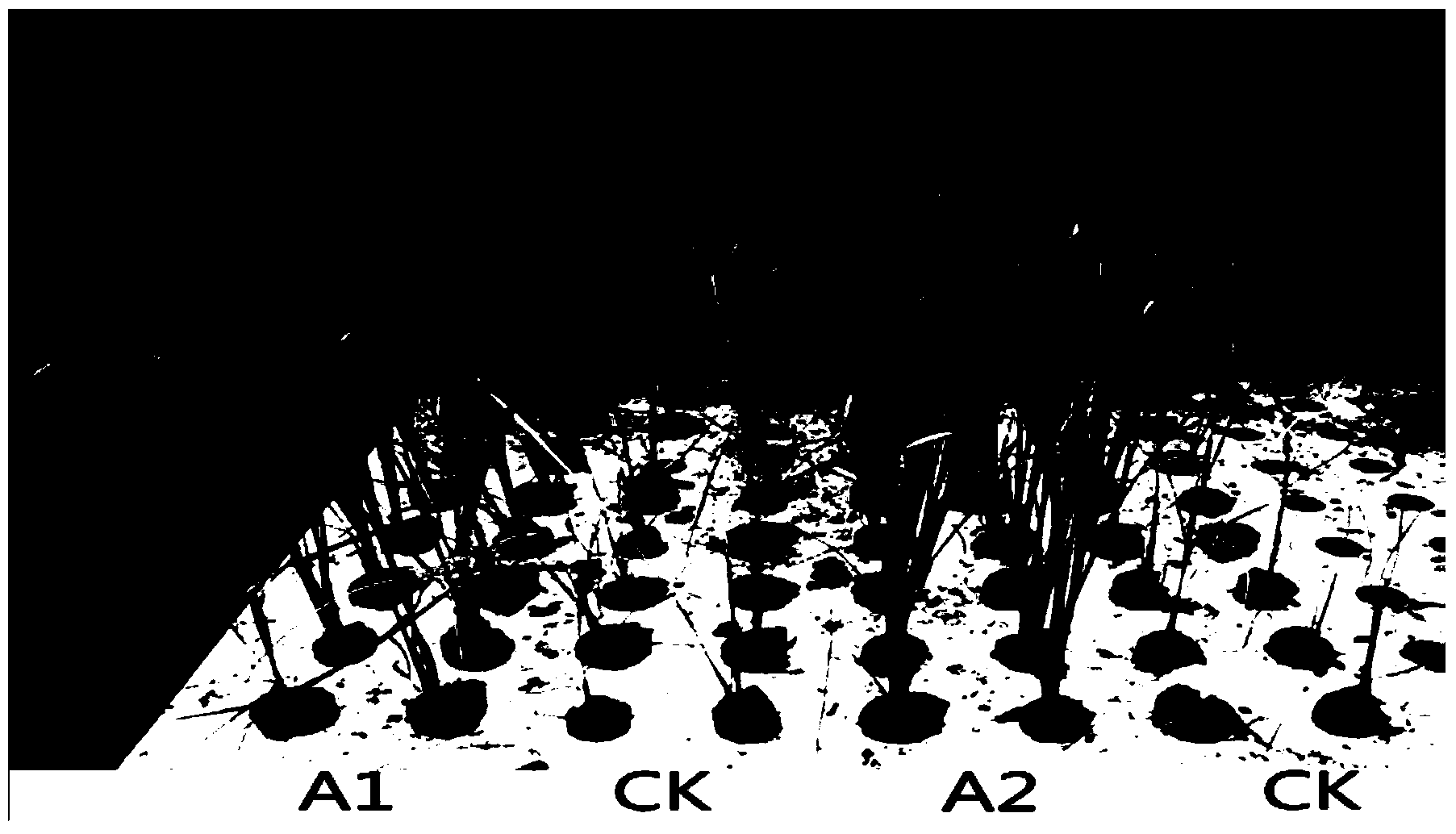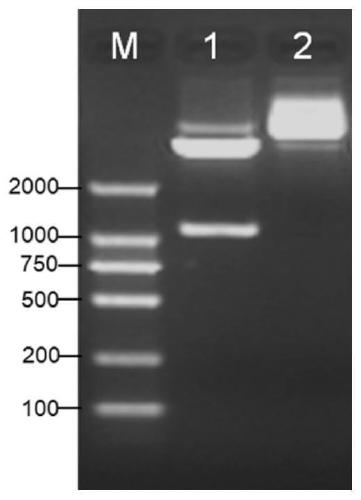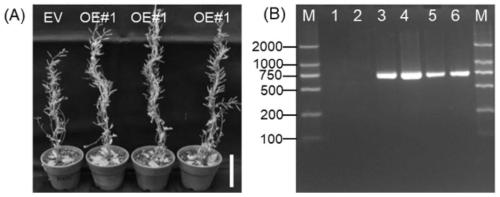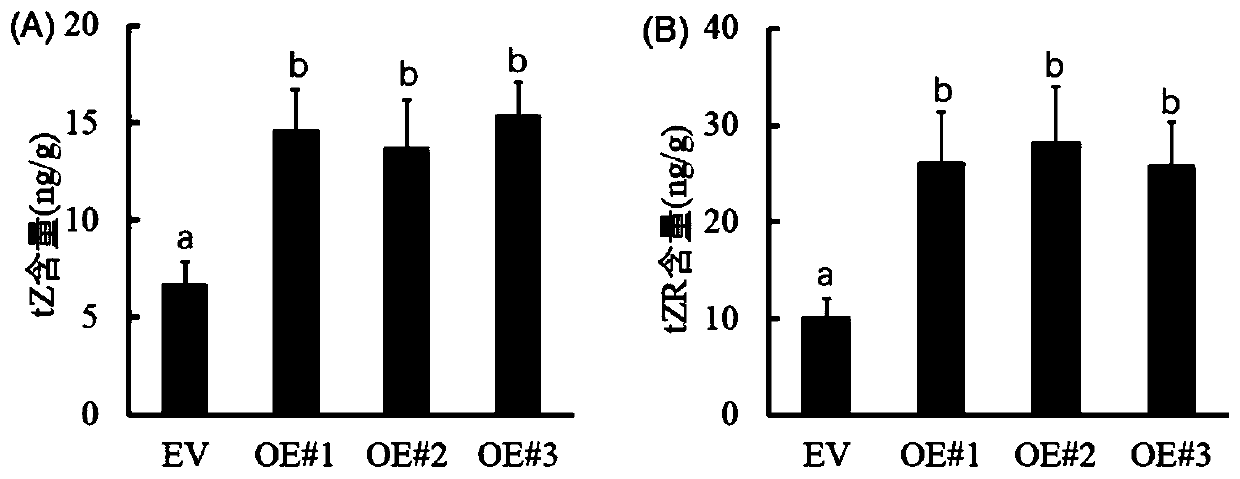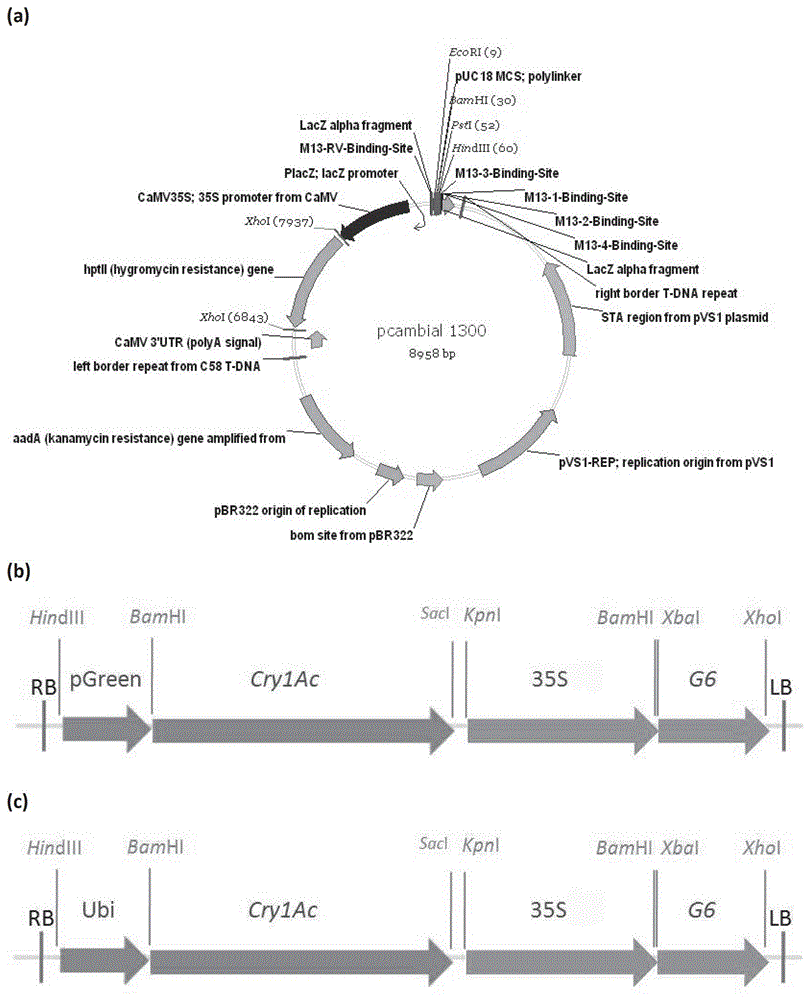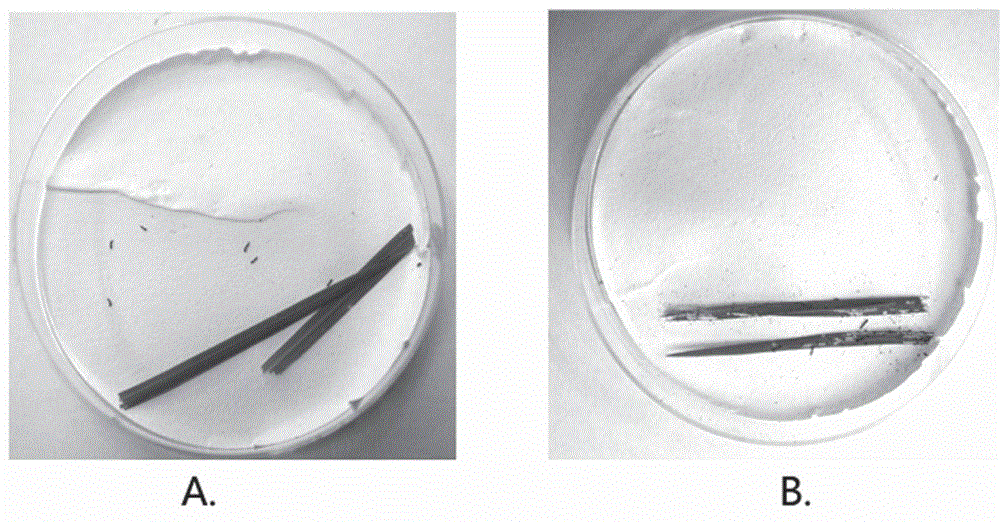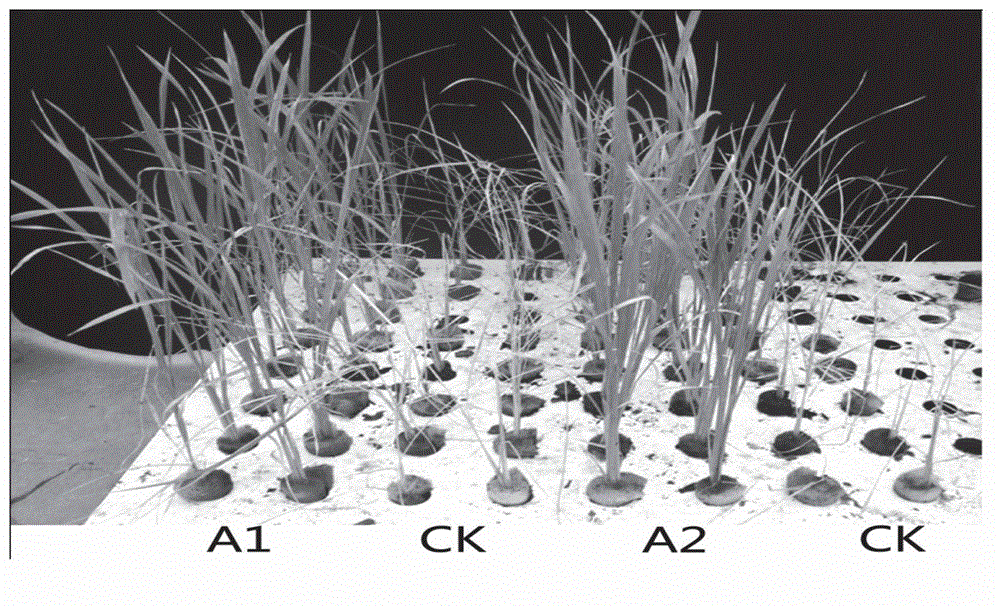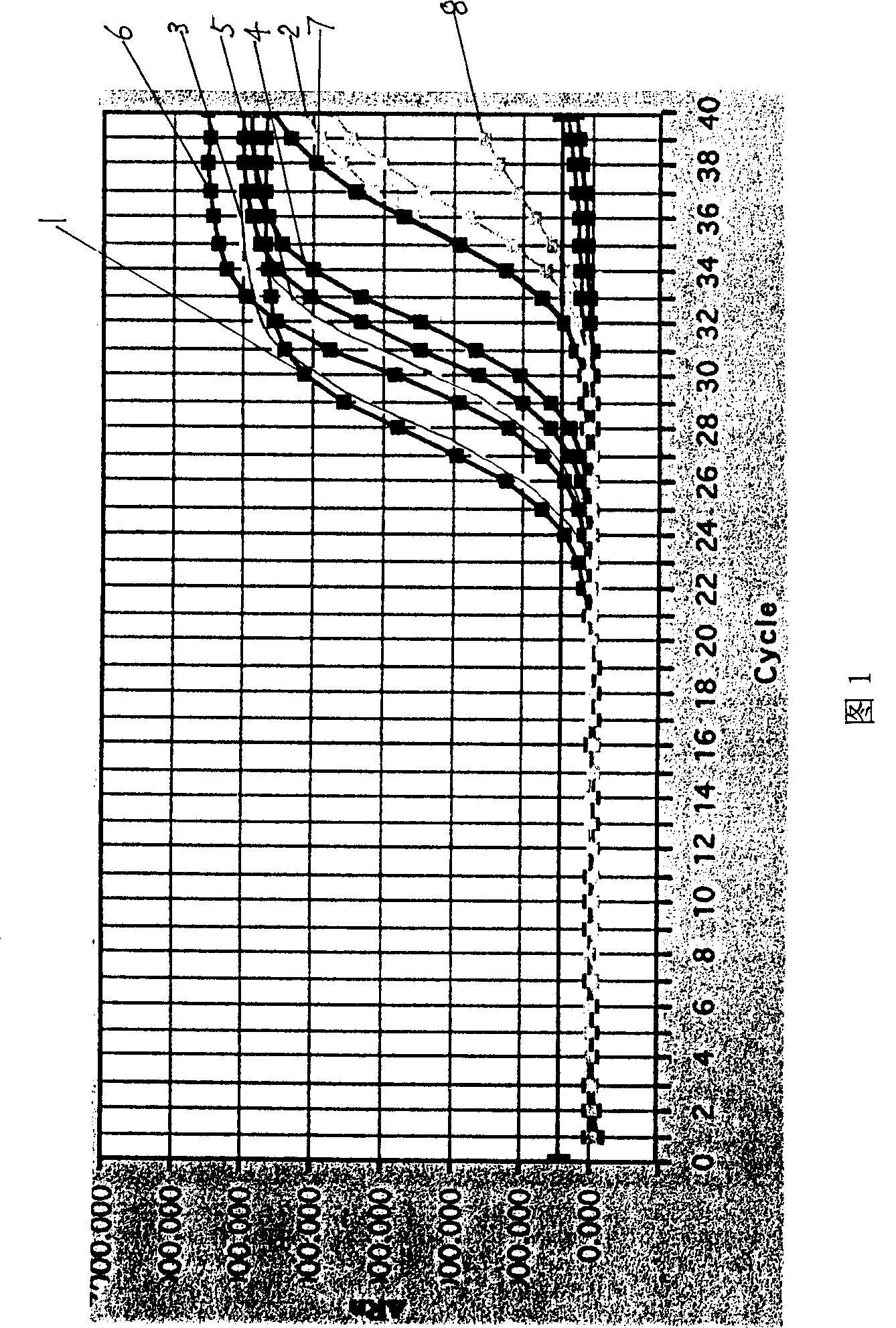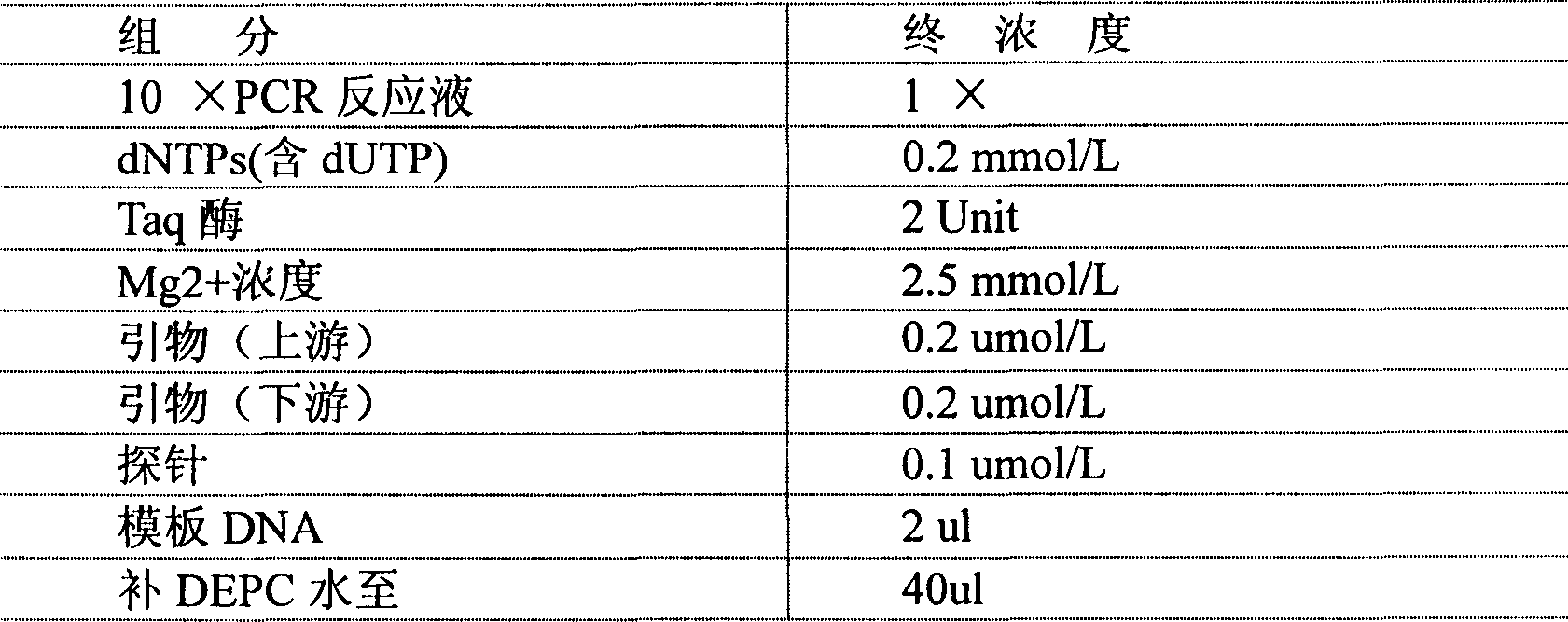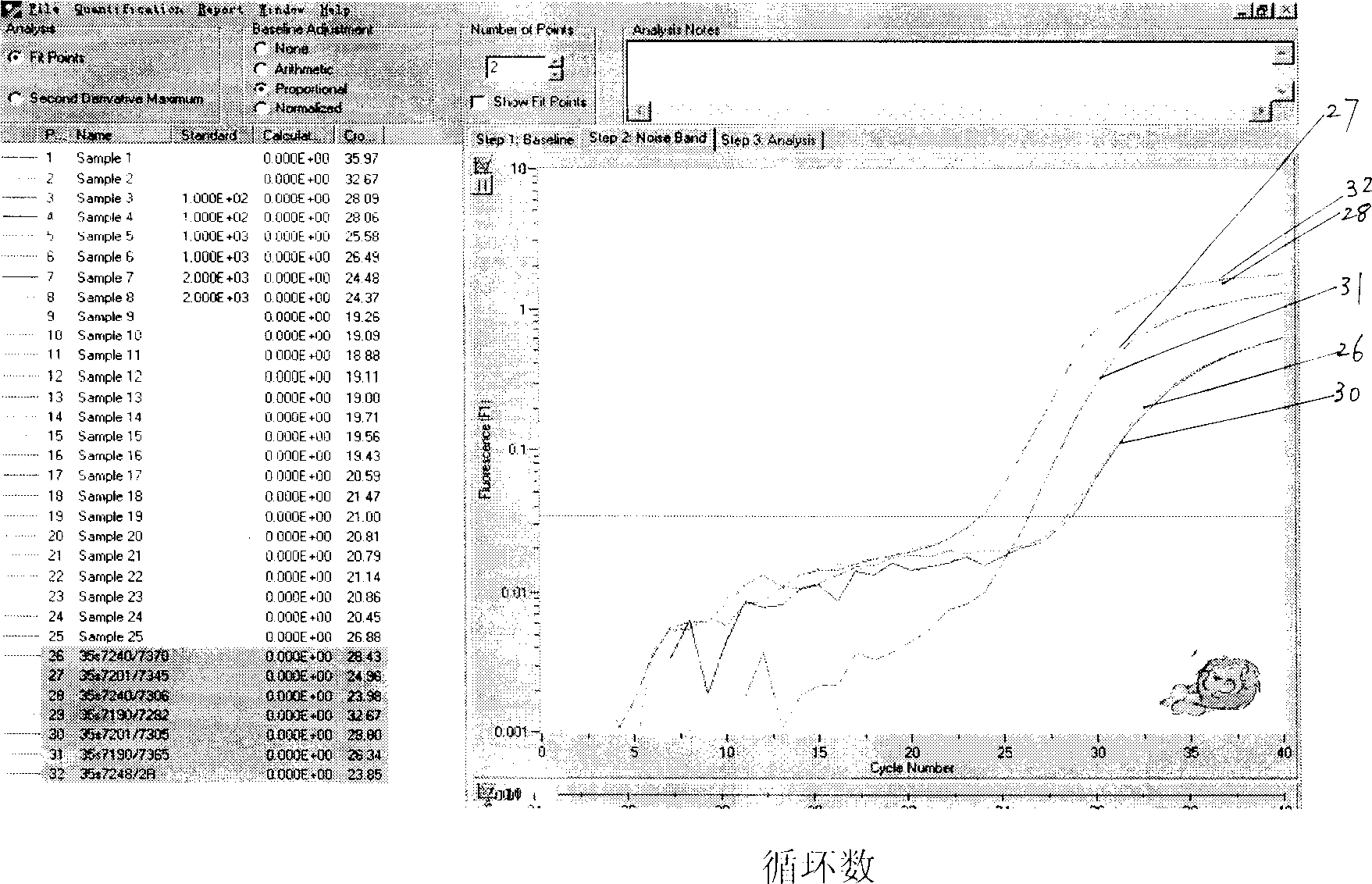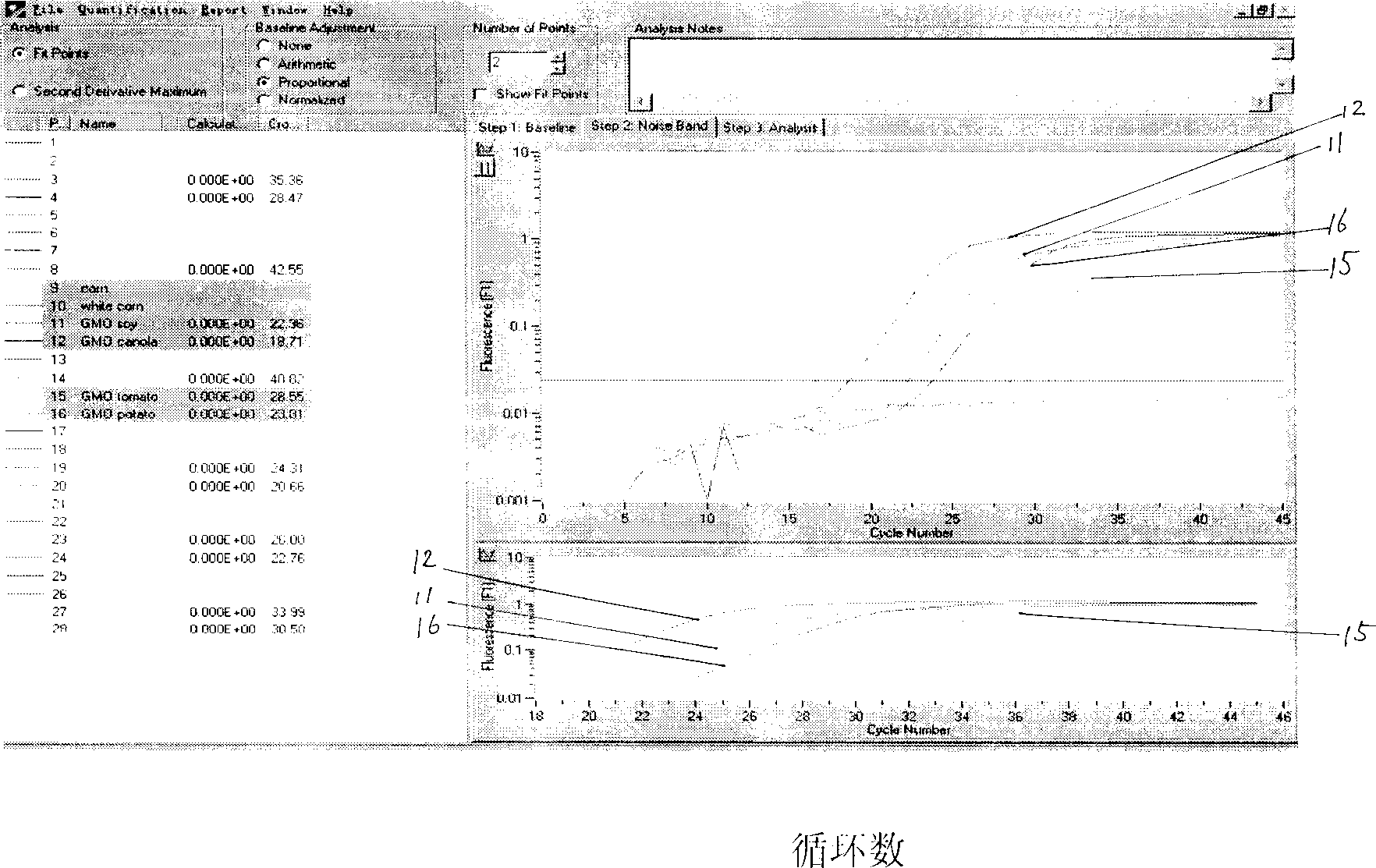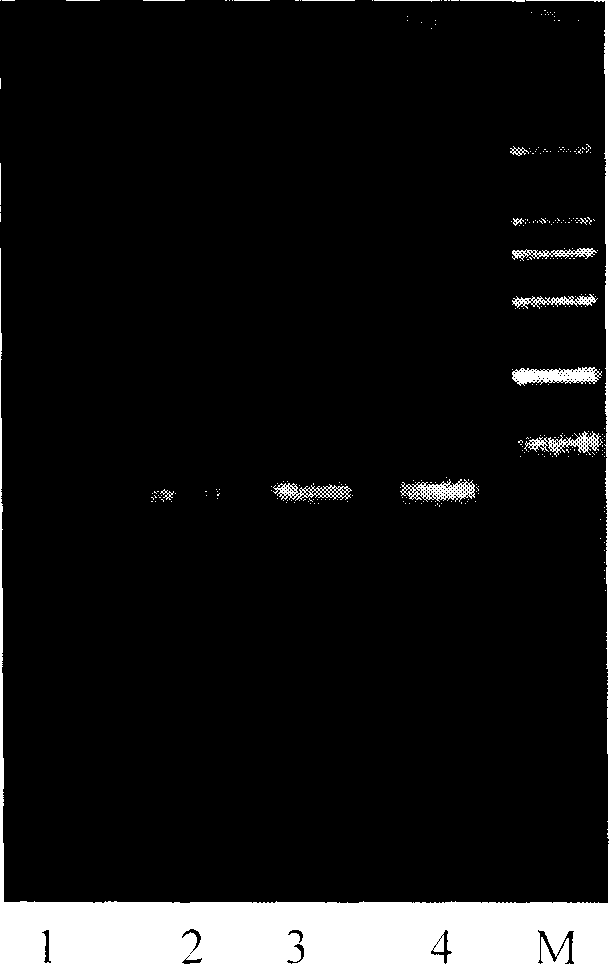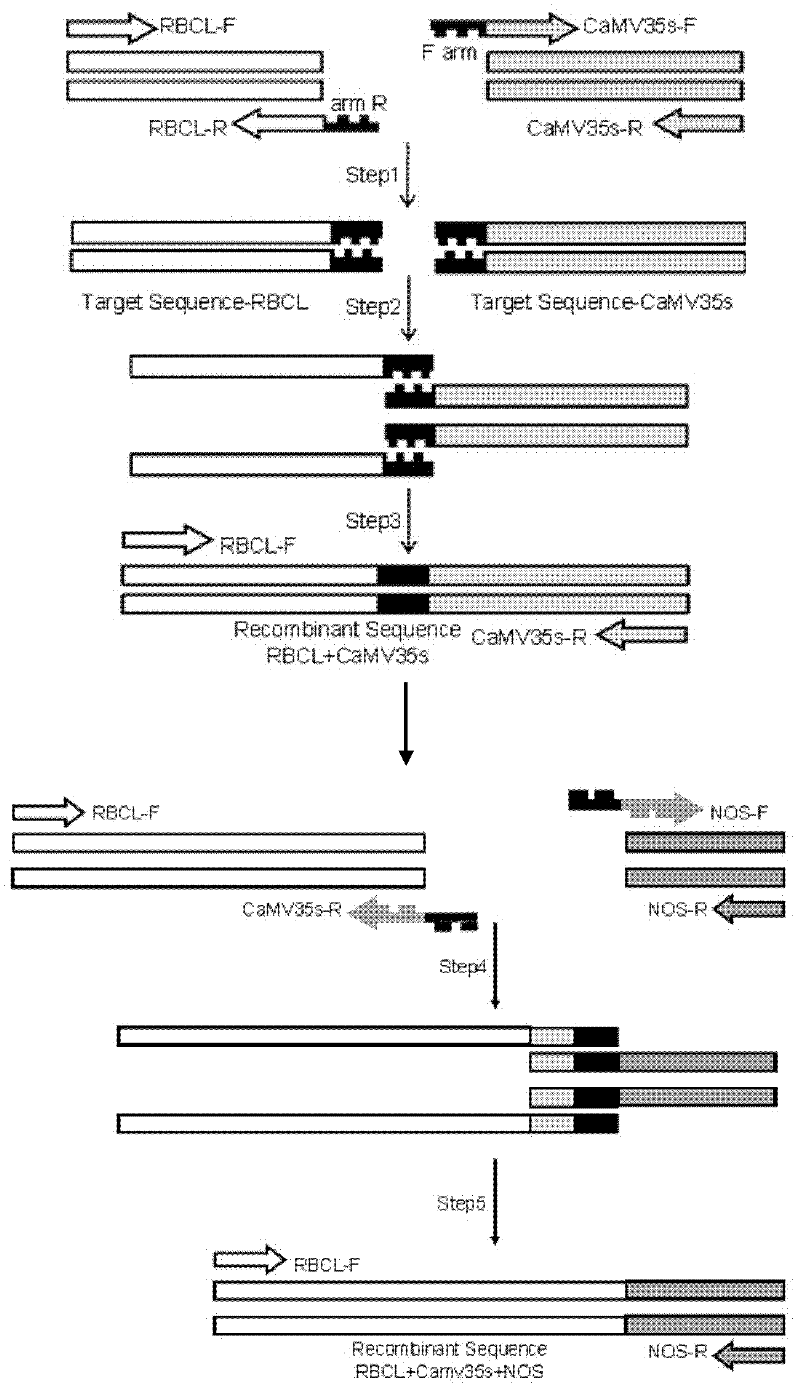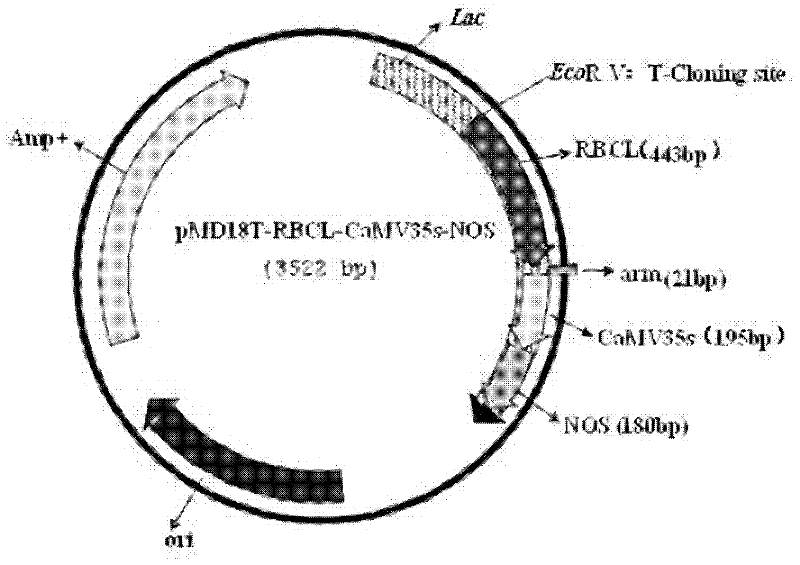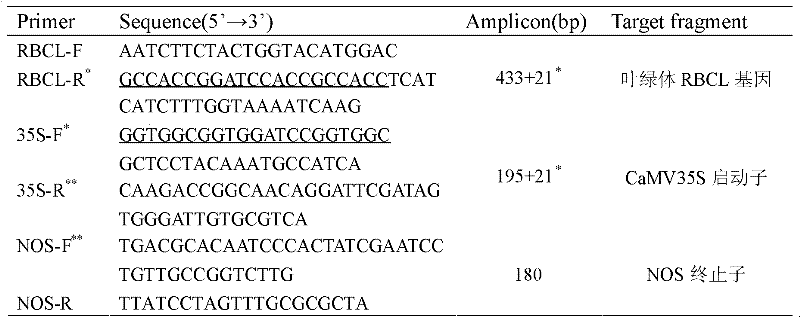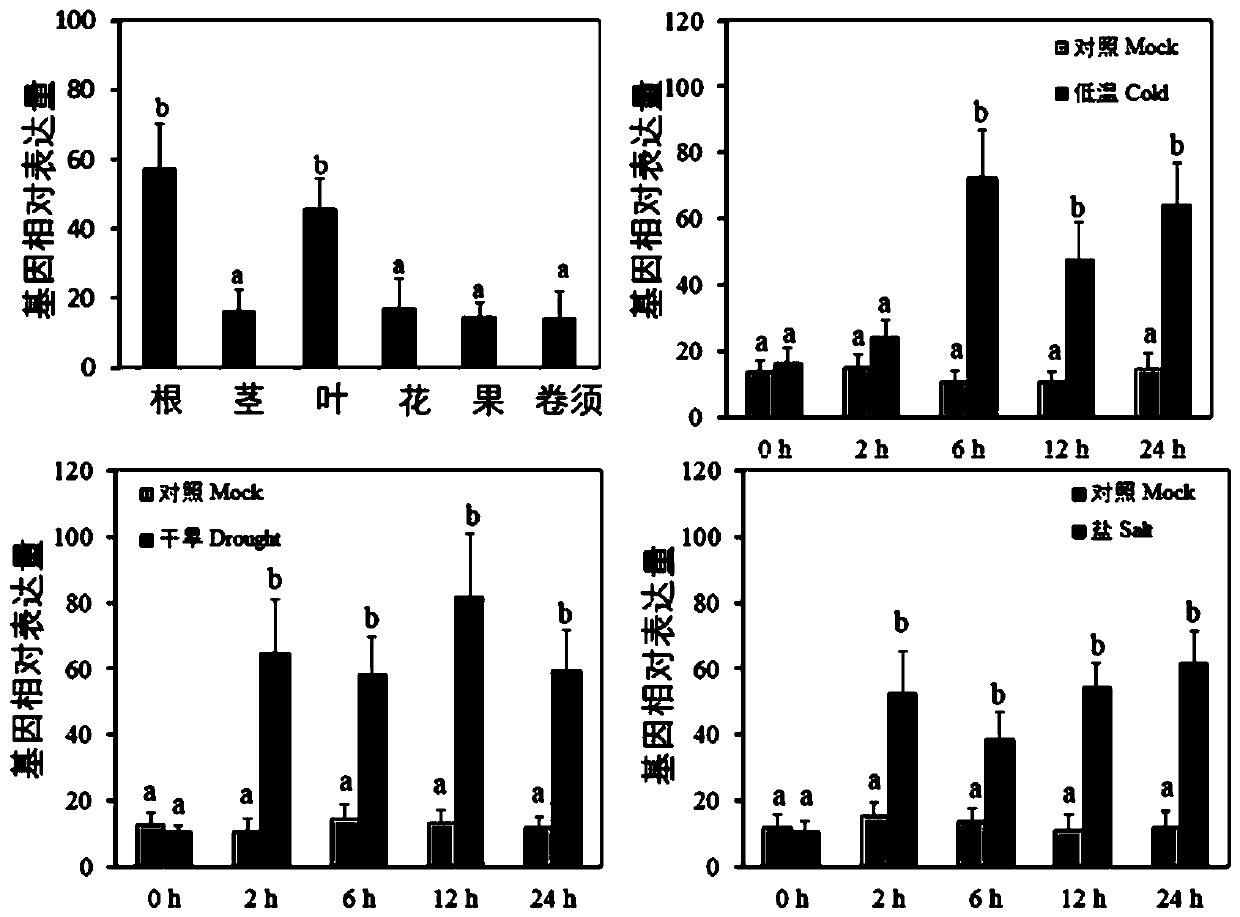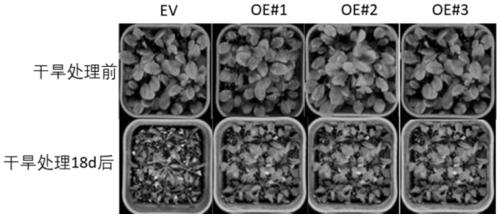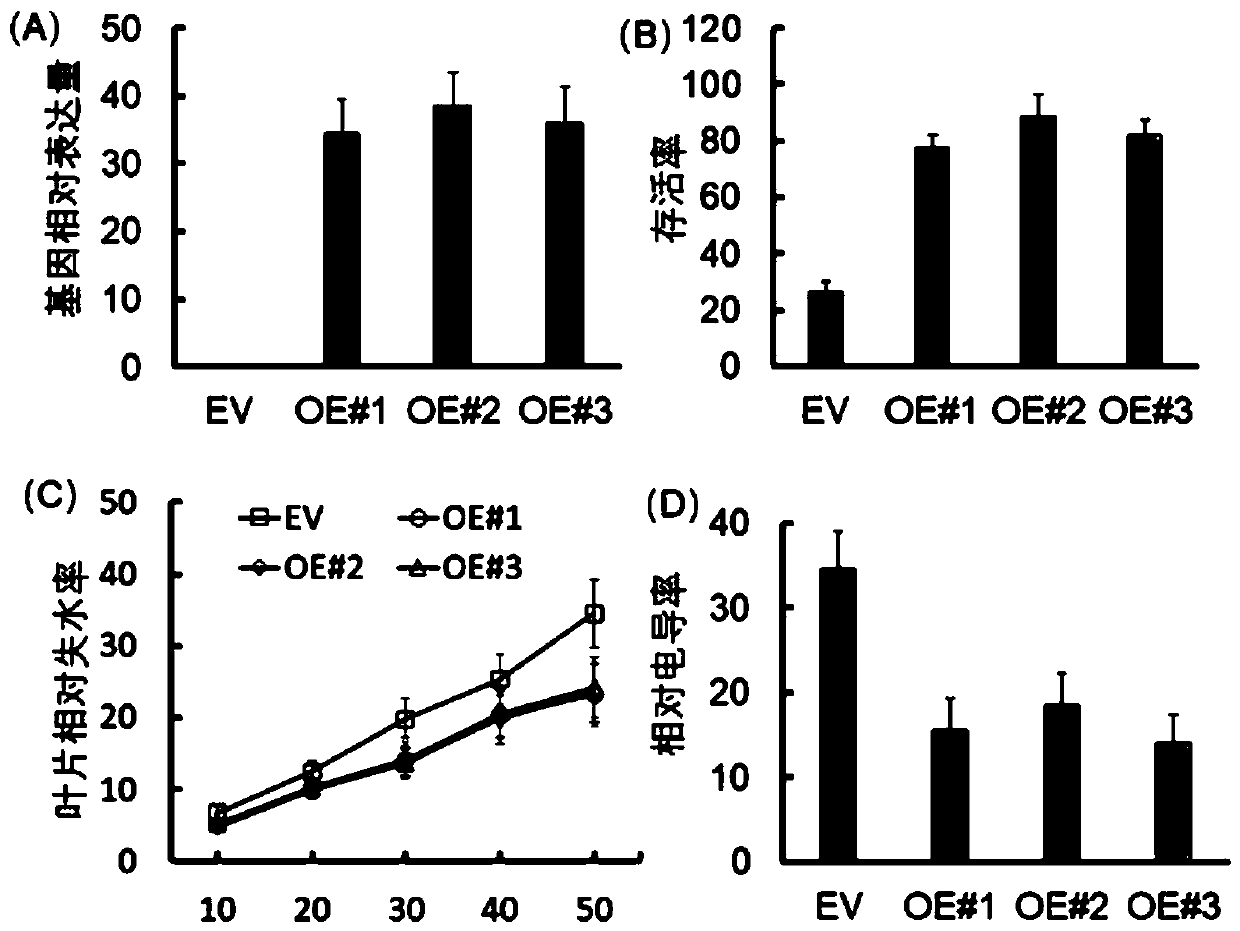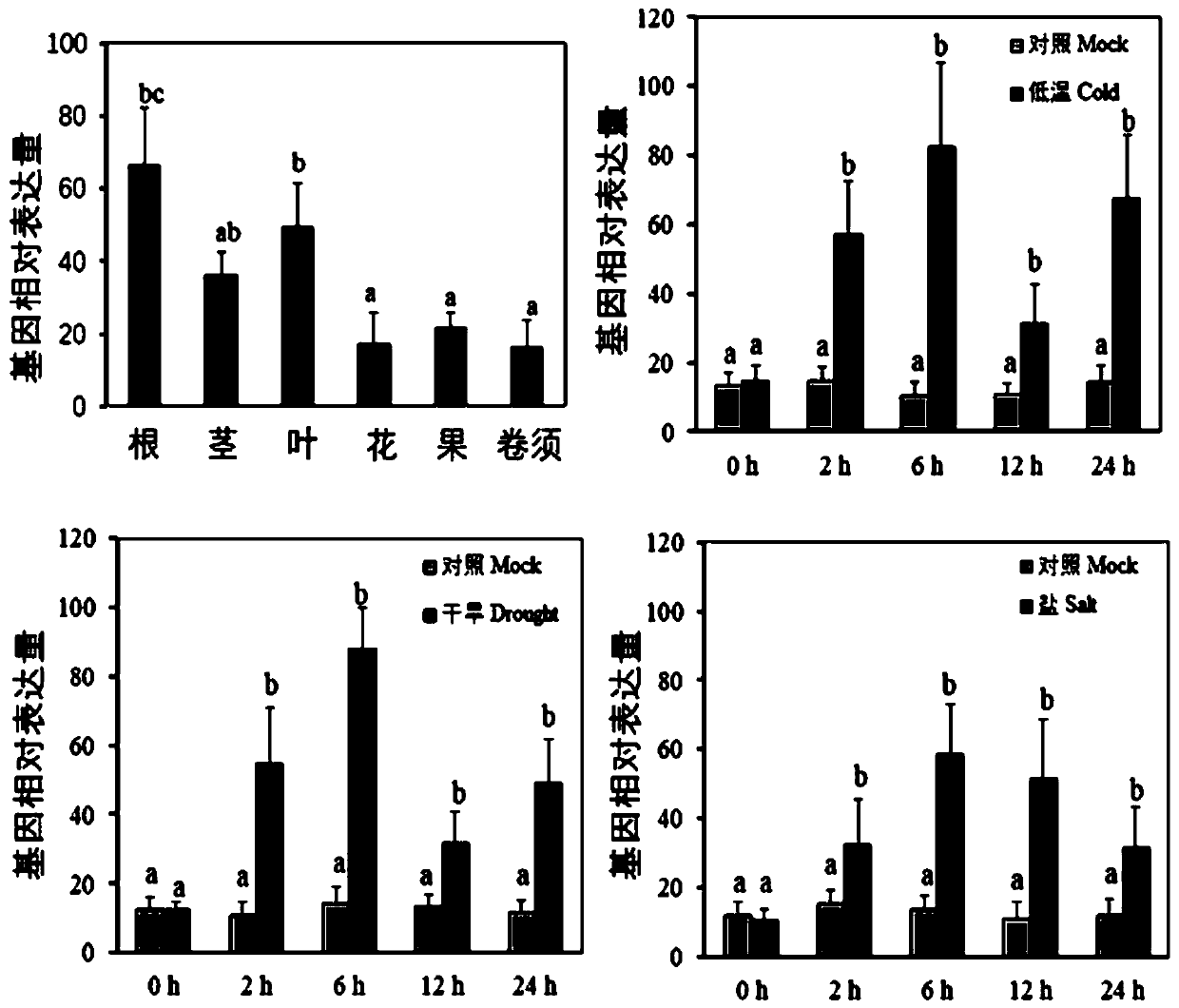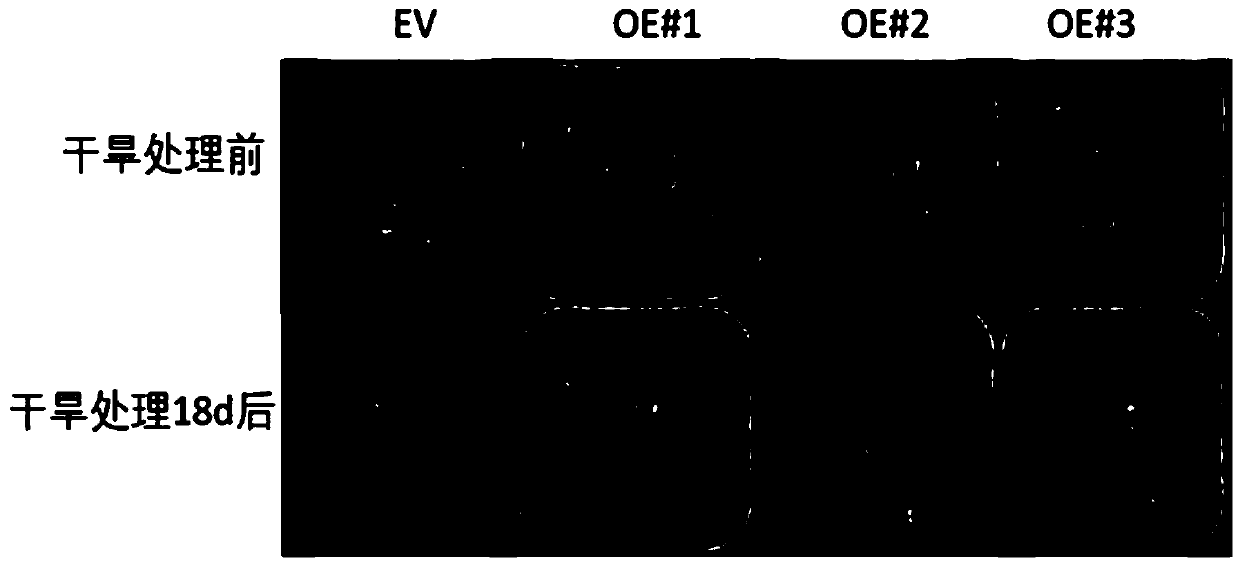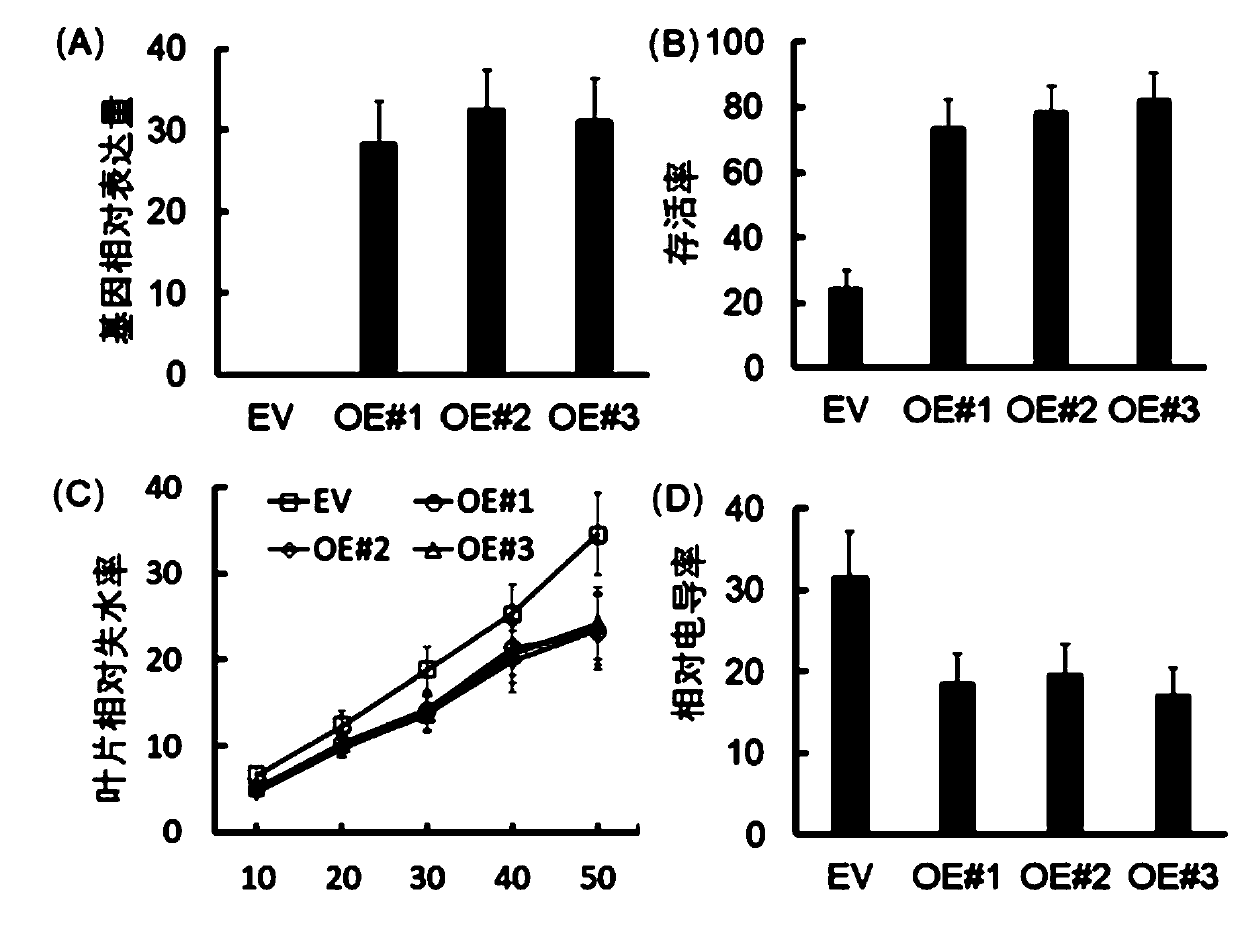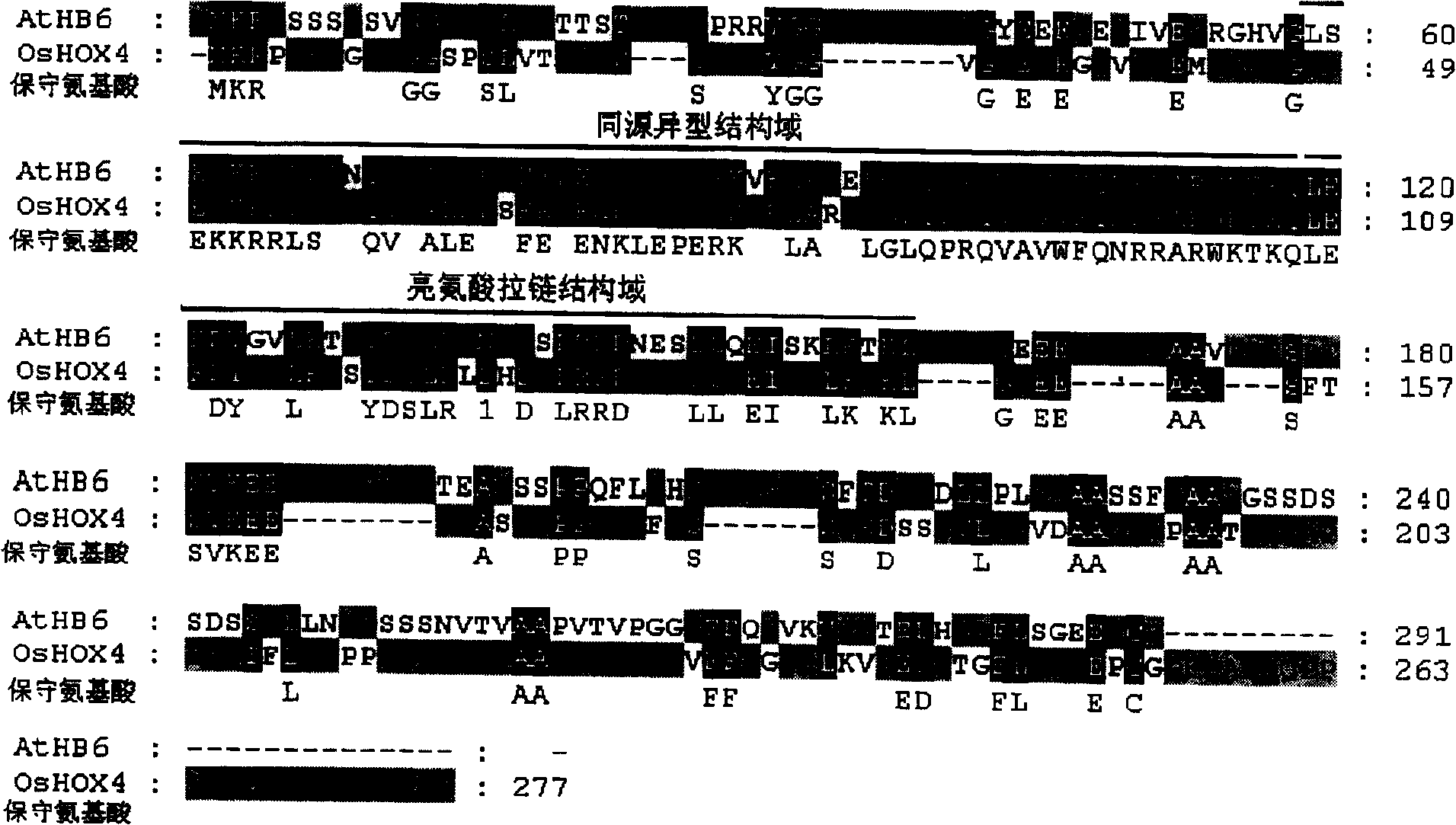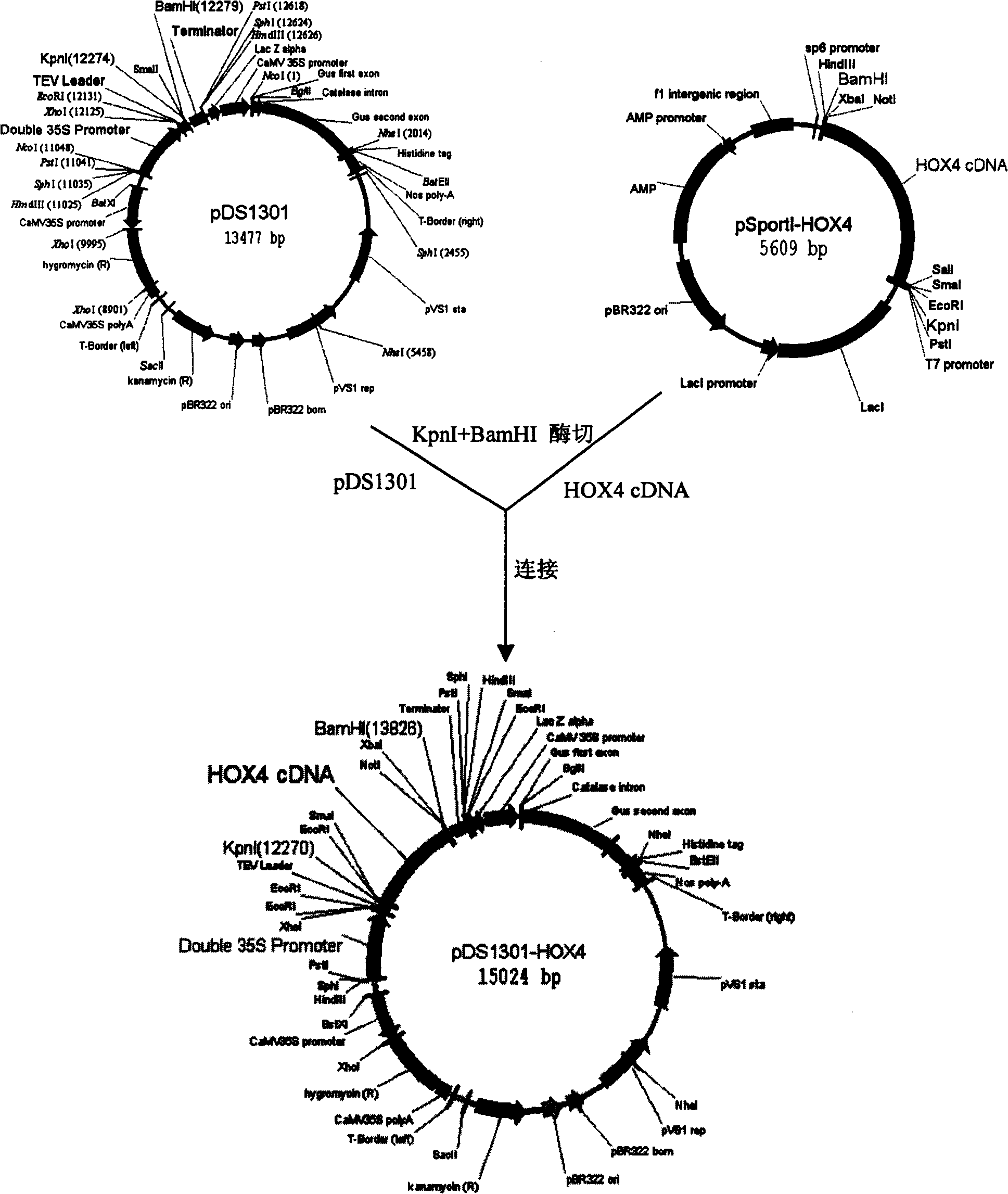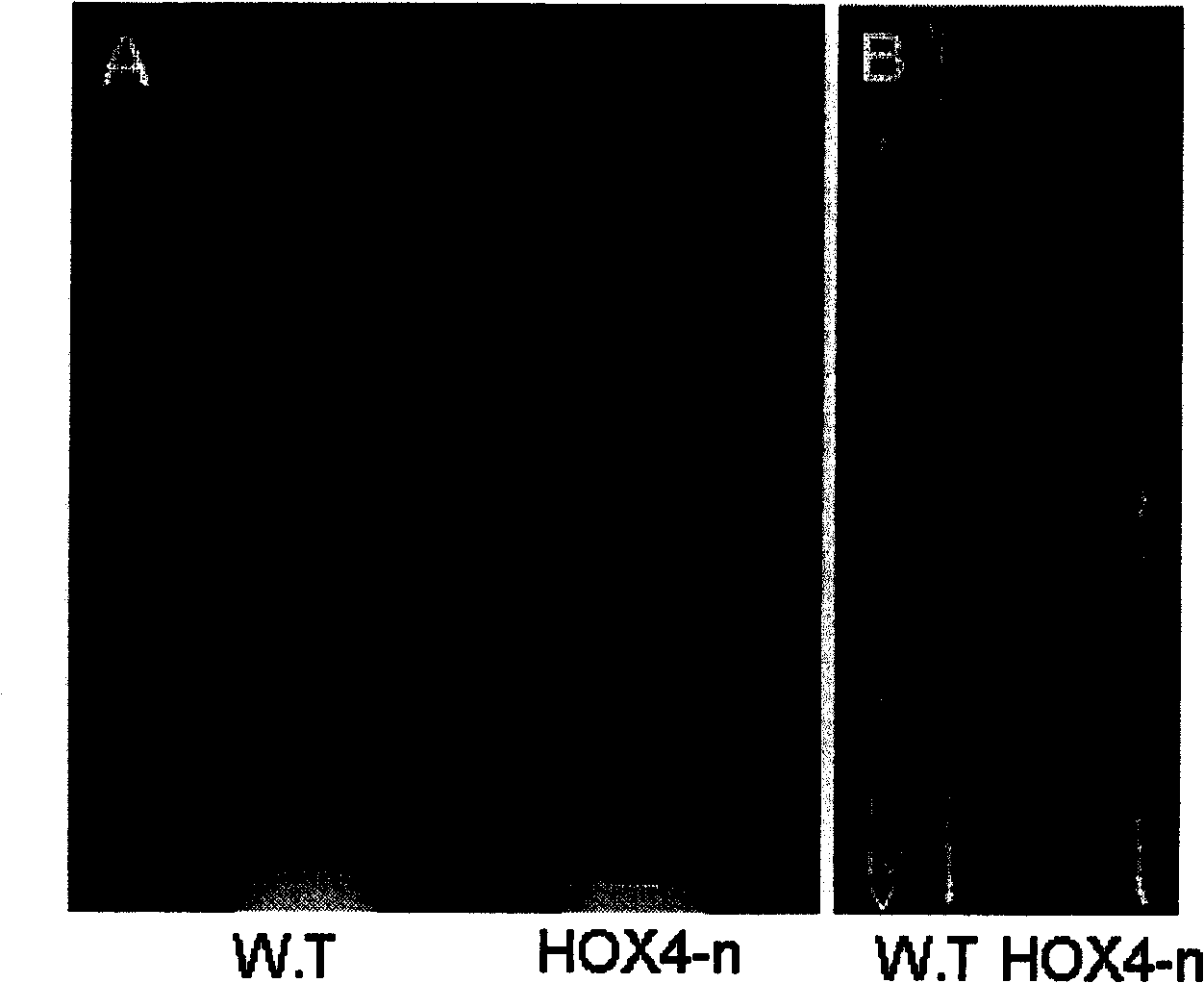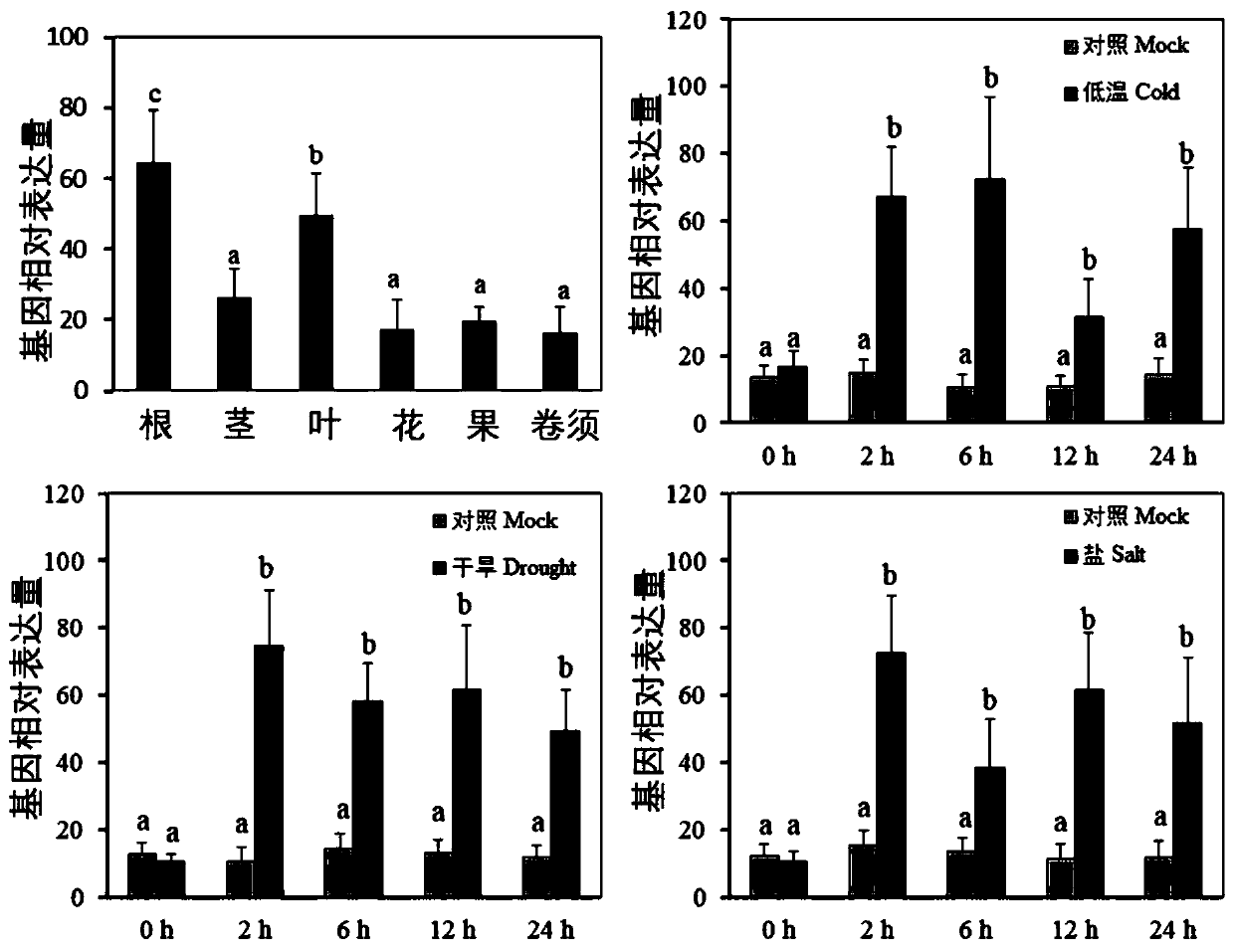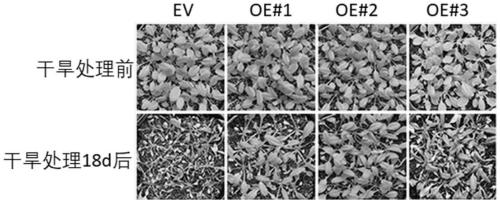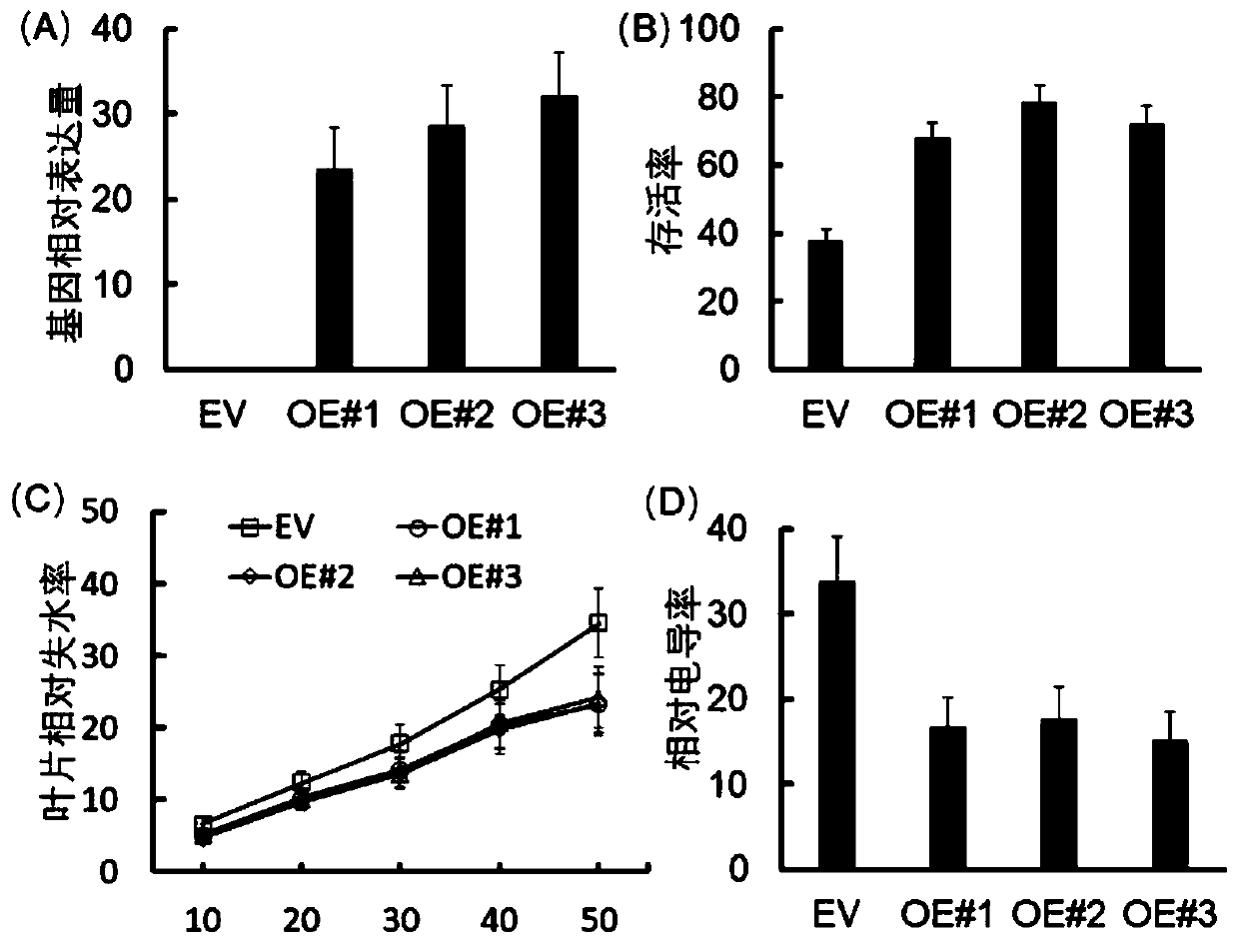Patents
Literature
51 results about "Cauliflower mosaic virus" patented technology
Efficacy Topic
Property
Owner
Technical Advancement
Application Domain
Technology Topic
Technology Field Word
Patent Country/Region
Patent Type
Patent Status
Application Year
Inventor
Cauliflower mosaic virus (CaMV) is a member of the genus Caulimovirus, one of the six genera in the family Caulimoviridae, which are pararetroviruses that infect plants. Pararetroviruses replicate through reverse transcription just like retroviruses, but the viral particles contain DNA instead of RNA.
Chimeric promoters comprising a caulimovirus promoter enhancer for use in plants
The present invention provides polynucleotide molecules useful for expressing transgenes in plants. More particularly, the present invention provides chimeric promoters comprising a Cauliflower mosaic virus 35S promoter enhancer fused with a plant actin gene promoter. The present invention also provides expression constructs containing the chimeric promoter. The present invention also provides transgenic plants and seeds containing the chimeric promoter.
Owner:MONSANTO TECH LLC
Plant expression vector of Tanba black soybean C2H2 zinc finger protein gene STOP1 and application thereof
InactiveCN102952822AIncrease aluminum resistanceReduce adsorptionVector-based foreign material introductionAngiosperms/flowering plantsBiotechnologyCauliflower mosaic virus
The invention discloses a plant expression vector Ppzp-35S-STOP1 of Tanba black soybean C2H2 zinc finger protein gene STOP1 and an application thereof for improving plant aluminum toxicity stress resistance. The vector is the plant expression vector containing constitutive promoter (35S) of cauliflower mosaic virus and C2H2 zinc finger protein gene STOP1 induced by the Tanba black soybean aluminum, the STOP1 gene is amplified from tanba black soybean roots, and the over-expression of the STOP1 gene in tobacco is controlled by utilizing the constitutive promoter, so that the aluminum toxicity resistance of the tobacco can be improved. The STOP1 transgene tobacco forcedly grows in solution containing 30microliters aluminum trioxide (AlCl3) for 24hours, the malic acid and the citric acid secreted from roots of the transgene tobacco as well as the aluminum resistance can be remarkably higher than that of a wild contrast plant, and the aluminum content on the root of the tobacco is remarkably lower than that of the wild plant.
Owner:KUNMING UNIV OF SCI & TECH
Application of transcription factor VP1 in regulating crop plant height and grain starch content
InactiveCN107058343AReduce plant heightHigh activityPlant peptidesFermentationCauliflower mosaic virusWild type
The invention discloses application of a maize transcription factor VP1 in regulating crop plant height and grain starch content. The maize transcription factor VP1 is inserted into a plant expression carrier carrying a plant selection gene, a target gene is started by a maize combined type Ubiquitin promoter, a selectable marking gene hptII is started by a 35S promoter from cauliflower mosaic virus; through genetic transformation of maize embryo callus mediated by agrobacteria, transgenic plants are obtained in batch. According to the maize transcription factor VP1 in regulating the crop plant height and grain starch content, the plant height and grain characters of homozygous strains of a transgenic offspring are authenticated, as is shown, compared with a wild type plant, the plant height of an overexpression VP1 gene plant is reduced by about 35%, and the starch content of seeds is increased by around 3%. A new path is opened up for increasing the height of plants of graminaceous crops like maize, sorghum, rice, and wheat, and increasing the content of grain starch of the graminaceous crops.
Owner:SICHUAN AGRI UNIV
Method for cultivating transgenic nitrogen-fixing plants
InactiveCN102226184AImprove nitrogen fixation capacityVector-based foreign material introductionAngiosperms/flowering plantsCauliflower mosaic virusNicotiana tabacum
The invention discloses a method for cultivating transgenic nitrogen-fixing plants. The method comprises the following steps: constructing recombinant expression vectors by using nucleotide sequences shown in SEQ ID NO: 3 and vectors with tobacco cauliflower mosaic virus 35S promoters; then importing the recombinant expression vectors into target plants so as to obtain transgenic plants with enhanced nitrogen-fixing capacity as compared with normal plants. In the method disclosed by the invention, based on the new functions of gma-miR172c found by the applicant, the gma-miR172c is overexpressed in target plants by using the genetic engineering method, thereby obtaining the transgenic plants with enhanced nitrogen-fixing capacity as compared with normal plants.
Owner:INST OF GENETICS & DEVELOPMENTAL BIOLOGY CHINESE ACAD OF SCI
Preparation and test method of rapid test kit for Roundup Ready transgenic Soybean and processed products thereof
InactiveCN101550445ASensitive detectionMaterial analysis by observing effect on chemical indicatorMicrobiological testing/measurementBetaineCauliflower mosaic virus
The invention pertains to a test technology of transgenic ingredients in food and feed, and especifically relates to a kit and a method for testing Roundup Ready transgenic Soybean and processed products thereof by using a loop-mediated isothermal amplification method. The kit comprises a loop-mediated isothermal amplification reaction solution A, a loop-mediated isothermal amplification reaction solution B, a Bst DNA polymerase C, a colour developing reagent D, and a positive control DNA E; the reaction solution A contains a reaction buffer, dNTP, magnesium sulfate, betaine, an upstream inner primer A: 5'-AGGTGGCACCTACAAATGCCATCGGCAGAGGCATCTTGAAC-3', a downstream inner primer A: 5'-TAGCTGGGCAATGGAATCCGAGGTCTCAGAAGACCAAAGGGC-3', an upstream outer primer A: 5'-TCCATCTTTGGGACCACTGT-3' and a downstream outer primer A: 5'-CGACACTCTCGTCTACTCCA-3'; and the reaction solution B contains a reaction buffer, dNTP, magnesium sulfate, betaine, an upstream inner primer B: 5'-AATCGAGCGGCGCCTCAGGCCGTAAGGAAGGCGACACC-3', a downstream inner primer B: 5'-AATGCCGCCACGGGCTCGTCGCCGATGAAGGTG-3', an upstream outer primer B: 5'-CCATGGGCGCCAGGAT-3' and a downstream outer primer B: 5'-ATCGGGCGCTTTGTGAG-3'. The method for testing the Roundup Ready transgenic Soybean and processed products thereof comprises the steps of the extraction of sample DNA, the loop-mediated isothermal amplification of cauliflower mosaic virus (CaMV) 35S promoter and Roundup Ready CP4-EPSPS gene and colour development test. The invention has the advantages of rapidness, strong specificity, high sensitivity, simple and convenient operation, good repeatability and low cost.
Owner:INSPECTION & QUARANTINE TECH CENT SHANDONG ENTRY EXIT INSPECTION & QUARANTINE BUREAU
Root Specific expression promoter from Capsicum annuum aquaporin gene and uses thereof
The present invention relates to a root specific plant expression promoter and 5′-untranslated region (5′-UTR) from Aquaporin gene of Capsicum annuum, a root specific plant expression vector comprising the same, a process for root specif-expression of a foreign gene by using said vector, and a plant transformed with said vector and seeds of the transformed plant. According to the present invention, the root specific expression promoter of the present invention can be used for root specific expression of a gene that is introduced to a transformed plant, compared to CaMV35S promoter from cauliflower mosaic virus by which gene expression is promoted in entire tissues of a plant. Consequently, the claimed invention can be advantageously used for the development of a transformed plant which is desired to be used for production of a useful material in a plant root.
Owner:JOUNG YOUNG HEE
Construction and application of infectious clone expression vector of watermelon mosaic virus
InactiveCN107964551AInvasive GuaranteeReduce error rateBacteriaMicroorganism based processesCauliflower mosaic virusNucleotide sequencing
The invention discloses an infectious clone expression vector of watermelon mosaic virus, wherein the infectious clone expression vector is prepared by cloning whole genome of the watermelon mosaic virus, in a homologous recombination manner, to a binary vector, pCambia 0390, which contains the 35S promoter of cauliflower mosaic virus. The nucleotide sequence of the infectious clone expression vector of the watermelon mosaic virus is represented as the SEQ ID No.9. In the invention, for the first time, the infectious clone of the watermelon mosaic virus, which can be inoculated in a manner ofagrobacteria infiltration and stably and high-effectively infect muskmelons, Cucurbita pepo and the like host plants, can be obtained; the infectious clone also can high-effectively express a heterologous protein.
Owner:SHANDONG AGRICULTURAL UNIVERSITY
Novel campanula flavonoid 3',5'-hydroxylase gene and its use
InactiveUS20150074855A1Increase delphinidin contentSugar derivativesOther foreign material introduction processesCauliflower mosaic virusHydroxylase gene
There is provided a novel Campanula flavonoid 3′,5′-hydroxylase gene, and a plasmid comprising the gene under the control of the cauliflower mosaic virus 35S promoter.
Owner:SUNTORY HLDG LTD
Regeneration and genetic transformation of Acacia mangium
InactiveUS6846971B1Other foreign material introduction processesFermentationCauliflower mosaic virusOrganogenesis
The present invention is directed to a method of Acacia mangium regeneration through organogenesis and a method of genetic transformation of Acacia mangium. The method of regeneration comprises inducing callus from different parts of seedlings and vegetatively micropropagated plantlets as explants; adventitious bud induction followed by pinnate leaf and bud elongation and eventually, elongated shoots were induced to root. Based on the regeneration system, a marker gene GUS under cauliflower mosaic virus promoter was introduced to Acacia mangium via Agrobacterium infection. GUS staining in the regenerated plants and Southern blot hybridization prove the incorporation of the foreign gene into the host genome and expression of the foreign gene.
Owner:TEMASEK LIFE SCIENCES LABORATORY
Potato leaf roll virus infectious clone and construction method thereof
PendingCN109797162ABacteriaMicroorganism based processesPotato leaf roll virusCauliflower mosaic virus
The invention discloses a potato leaf roll virus infectious clone and a construction method thereof. The potato leaf roll virus infectious clone is obtained by cloning a whole genome of a potato leafroll virus into a pCB301 binary vector containing a cauliflower mosaic virus double 35S promoter in a homologous recombination mode. The potato leaf roll virus infectious clone which can be inoculatedby an agrobacterium infiltration method and stably and efficiently infects host plants such as nicotiana benthamiana and potatoes is prepared for the first time, and the potato leaf roll virus infectious clone has important significance for preventing and treating potato leaf roll virus diseases.
Owner:SHANDONG AGRICULTURAL UNIVERSITY
Nest polymerase chain reaction (PCR) detecting method of transgenic crop cauliflower mosaic virus
InactiveCN102534046ASolve detection technical problemsEfficient detection methodMicrobiological testing/measurementMicroorganism based processesAgricultural scienceConserved sequence
A nest polymerase chain reaction (PCR) detecting method of a transgenic crop cauliflower mosaic virus relates to the field of molecular biology. The method designs two specificity outer primers and adopts a CaMV35S promoter published by an announcement NO. 953-6-2007 of a ministry of agriculture to detect a primer serving as an inner primer according to a conserved sequence of a cauliflower mosaic virus CaMV35S promoter, and the group of primers can detect the cauliflower mosaic virus CaMV35S promoter in different transgenic crops and has the characteristic of a broad spectrum. The detecting method has the advantages of being efficient, sensitive, accurate and the like, can avoid a 'false negative' result, and can effectively solve the technical problem of detecting transgenic crops. The nest PCR detecting method can provide technical support for agricultural transgenic organism safety management directly, can conduct effective monitoring on research, production and sales of transgenic crop products, and has important meaning on guaranteeing health of people, environment safety and biodiversity.
Owner:SHENYANG INSTITUTE OF CHEMICAL TECHNOLOGY
Primer for testing cauliflower mosaic virus (CaMV) 35S promoter in food and feed
InactiveCN101550444ASensitive detectionMaterial analysis by observing effect on chemical indicatorMicrobiological testing/measurementCauliflower mosaic virusAgricultural science
The invention pertains to a test technology of transgenic ingredients in food and feed, and specifically relates to a primer pair used for testing a common promoter used for transgenic plants in food and feed, namely, cauliflower mosaic virus (CaMV) 35S promoter. The invention designs a pair of specific primers, aiming at the cauliflower mosaic virus (CaMV) 35S promoter and according to the genetic conserved sequence thereof. The primer pair is used and a loop-mediated isothermal amplification technology is adopted for rapidly, sensitively and specifically testing the CaMV 35S promoter, thus screening whether the products contain transgenic plant ingredients. The primer can also be provided in kit and together with other reagents and used for nucleic acid amplification. The method has simple and convenient operation and good repeatability.
Owner:INSPECTION & QUARANTINE TECH CENT SHANDONG ENTRY EXIT INSPECTION & QUARANTINE BUREAU
Gene combination expressing and producing betacyanin in rice, and application thereof
InactiveCN110592124AAntibody mimetics/scaffoldsNucleic acid vectorGenetically modified riceCauliflower mosaic virus
The present invention discloses a gene combination expressing and producing betacyanin in rice, and an application thereof. The gene combination comprises a melo gene, a BvDODA1 gene and a BvCYP76AD1gene. Based on codon preferences of rice, the melo gene is optimized as a meloS gene and a nucleotide sequence is shown as SEQ ID NO.1; the BvDODA1 gene is optimized as a BvDODA1S gene and a nucleotide sequence is shown as SEQ ID NO.2; the BvCYP76AD1 gene is optimized to a BvCYP76AD1S gene and a nucleotide sequence is shown as SEQ ID NO.3; the three genes are respectively fused with a 35S promoterof a cauliflower mosaic virus and a NOS terminator of agrobacterium rhizogenes, corresponding gene expression cassettes are respectively constructed, then the gene expression cassettes are ligated into plant expression vectors to obtain polygenic plant transforming vectors containing the three gene expression cassettes, and the vectors are transformed into rice to obtain betacyanin-enriched transgenic rice which has a betacyanin content about 2.0-2.6 mg / g FW.
Owner:SHANGHAI ACAD OF AGRI SCI
Plant expression vector of alfalfa malic acid channel protein gene MsALMT1, and applications thereof
InactiveCN102952821AIncrease aluminum resistancePromote secretionFermentationVector-based foreign material introductionBiotechnologyCauliflower mosaic virus
The present invention discloses an alfalfa aluminum induced malic acid channel protein gene plant expression vector pK2-35S-MsALMT1, which is a plant expression vector containing a constitutive promoter (35S) of cauliflower mosaic virus and alfalfa aluminum induced malic acid channel protein gene MsALMT1. According to the present invention, MsALMT1 gene is amplified from alfalfa, and a constitutive promoter is adopted to control overexpression of the MsALMT1 gene in tobacco so as to improve aluminum toxicity resistance of the tobacco; and experiment results show that: after the trans-MsALMT1 gene tobacco is subjected to stress growth for 24 h in a solution containing 30 muM of AlCl3, malic acid secreted by root tip and aluminum resistance of the trans-MsALMT1 gene tobacco are significantly higher than malic acid secreted by root tip and aluminum resistance of the wild-type control plant, and aluminum content in root tip of the trans-MsALMT1 gene tobacco is significantly lower than aluminum content in root tip of the wild-type plant.
Owner:KUNMING UNIV OF SCI & TECH
Wild grape VyGOLS gene and application of coding protein of wild grape VyGOLS gene to drought coercion
ActiveCN110452917AImprove drought resistanceFermentationGlycosyltransferasesBiotechnologyCauliflower mosaic virus
The invention relates to a wild grape VyGOLS gene and an application of coding protein of the wild grape VyGOLS gene to drought coercion, and belongs to the technical field of plant genetic engineering. A genetically modified technique of a strong promoter (cauliflower mosaic virus 35S promoter) driving principle is adopted, an overexpression vector of a V.yanshanensis VyGOLS gene is transferred to arabidopsis thaliana, and a genetically modified arabidopsis thaliana plant is obtained. Experiment verifies that compared with an arabidopsis thaliana plant for transforming an empty vector, the overexpression VyGOLS gene can cause the accumulation of stress tolerance relevant substances in the genetically modified arabidopsis thaliana and expression of drought tolerance related genes, and thegenetically modified plant is high in drought resistance. Therefore, the wild grape VyGOLS gene and the recombinant expression vector thereof can be used for breeding of plant drought-resistant varieties.
Owner:HENAN UNIV OF SCI & TECH
Regeneration and genetic transformation of acacia mangium
InactiveUS20050155116A1BryophytesOther foreign material introduction processesCauliflower mosaic virusOrganogenesis
Owner:TEMASEK LIFE SCIENCES LABORATORY
Application of barley HvHKT1gene
InactiveCN103275977AImprove utilizationGuaranteed normal growthVector-based foreign material introductionAngiosperms/flowering plantsGenomicsHalotolerance
The invention relates to plant function genomics, in particular to the application of a barley HvHKTI gene in building transgenic plants, wherein after the separation and cloning of a HvHKT1gene coding sequence (coding sequence), the coding sequence is connected with a promotor of a mosaic virus of a cauliflower, and then arabidopsis is converted; and finally evaluation is conducted for salt endurance of the transgenic arabidopsis and the wild type Arabidopsis. According to the invention, the salt endurance of the transgenic plants is improved, and the barley HvHKT1 gene has a nucleotide sequence shown by SEQ ID NO:1.
Owner:ZHEJIANG UNIV
Transcription factor gene OsHOX4 for controlling synthesis of rice gibberellin and use thereof
InactiveCN1966686AFermentationVector-based foreign material introductionCauliflower mosaic virusWild type
The invention belongs to the field of plant gene engineering, and specifically involves the separation and clone, function identification and application of DNA fragment (gene) for regulating rice gibberellin synthesis. The said gene OsHOX4 relates to the rice gibberellin synthesis. The invention includes: combining the complete coding sequence of the said gene with Cauliflower mosaic virus promoter CaMV35S, transferring into rice directly, the transgenic plants are obviously shorter than wild control plants, the transgenic plants can recover to normal height under the effect of exogenous gibberellin (GA3), it is found by further analysis that the expression of gibberellin oxidase (OsGA3ox2) in transgenic plants is inhibited, showing that OsHOX4 can regulate the expression of OsGA3ox2 and control the synthesis of gibberellin.
Owner:HUAZHONG AGRI UNIV
Novel campanula flavonoid 3',5'-hydroxylase gene and use of same
InactiveCN104245934AIncrease delphinidin contentRecombinant DNA-technologyOxidoreductasesCauliflower mosaic virusHydroxylase gene
Owner:SUNTORY HLDG LTD
Plant chlorenchyma specific expression promoter pGreen and application thereof
ActiveCN103525818ASpecific expressionEfficient expressionFermentationPlant genotype modificationCauliflower mosaic virusNucleotide sequencing
The invention discloses a plant green tissue-specific expression promoter pGreen. A nucleotide sequence of the promoter is shown as SEQ ID NO:1. The plant green tissue-specific expression promoter pGreen comprises an enhancer sequence of a 35S promoter of a Cauliflower mosaic virus of tobacco and a promoter sequence which is separated from a maize PD450 gene. The invention also discloses application of the plant green tissue-specific expression promoter pGreen to the preparation of transgenic plants with insect resistance, and application of the plant green tissue-specific expression promoter pGreen to the improvement on the anti-insect activity of plants.
Owner:ZHEJIANG UNIV
Pest-resistant gene T-DNA vector and application thereof
InactiveCN108998467AHigh expressionEfficient expressionVector-based foreign material introductionAngiosperms/flowering plantsCauliflower mosaic virusCotton bollworm
The invention discloses construction of a pest-resistant gene T-DNA vector and application thereof. A compound promoter is used for promoting expression of a pest-resistant gene; the compound promotercontains a cauliflower mosaic virus (CaMV) 35S promoter and an intron sequence of rice actin Actin1; the pest-resistant is formed by connecting Cry1Ab and Vip3A through a connecting peptide. After being built, a recombinant vector is transferred into corn, so that the expression volume of pest-resistant protein in transgenic maize is obviously increased. The recombinant vector disclosed by the invention can be used for preparing cells of a pest-resistant plant; the pest-resistant plant comprises maize, rice and the like. A transgenic plant transformed from the recombinant vector disclosed bythe invention can efficiently kill main lepidoptera pests such as armyworm, prodenia litura, european corn borer, cotton bollworm and beet armyworm.
Owner:ZHEJIANG UNIV
Application of grape VlKNOX gene in promoting cytokinin synthesis and regulating fruit setting
ActiveCN110452915AIncrease productivityIncreased mitogen contentPlant peptidesFermentationVitis viniferaFruit set
The invention relates to an application of grape VlKNOX gene for promoting cytokinin synthesis and regulating fruit setting, and belongs to the technical field of plant genetic engineering. In the invention, a transgenic technology of a strong promoter (cauliflower mosaic virus 35S promoter) driving principle is utilized to transfer an excess-expression vector of a VlKNOX gene into Arabidopsis thaliana so as to obtain a transgenic Arabidopsis thaliana plant. Experiments prove that: compared with an Arabidopsis thaliana transformed with an empty vector, excessive expression of the VlKNOX gene leads to large accumulation of cytokinins in the transgenic Arabidopsis thaliana, and the fruit setting rate of fruits is obviously improved. Therefore, the grape VlKNOX gene and the recombinant expression vector thereof can be used for breeding high-yield plant variety.
Owner:HENAN UNIV OF SCI & TECH
Plant green tissue-specific expression promoter pGreen and application thereof
InactiveCN102876679AEfficient expressionImprove securityVector-based foreign material introductionAngiosperms/flowering plantsCauliflower mosaic virusNucleotide sequencing
The invention discloses a plant green tissue-specific expression promoter pGreen. A nucleotide sequence of the promoter is shown as SEQ ID NO:1. The plant green tissue-specific expression promoter pGreen comprises an enhancer sequence of a 35S promoter of a Cauliflower mosaic virus of tobacco and a promoter sequence which is separated from a maize PD450 gene. The invention also discloses application of the plant green tissue-specific expression promoter pGreen to the preparation of transgenic plants with insect resistance, and application of the plant green tissue-specific expression promoter pGreen to the improvement on the anti-insect activity of plants.
Owner:ZHEJIANG UNIV
Probe sequence for qualitatively detecting transgenic crop containing cauliflower mosaic virus 35S promotor using fluorescence PCR and reagent kit
A fluorescence PCR qualitative determination for transgene crop probe sequence containing cauliflower mosaic virus 35S promoter gene and reagent kit thereof, the probe sequence includes, the probe sequence formed in the region by the extension of the sequence tgcctctgccgacagtggtcccaa upstream by 5 bases and downstream by 5 bases. The reagent kit comprises nucleic acid extraction reagent, and nucleic acid amplification reagent, the nucleic acid amplification reagent comprises 35sPCR reaction solution, 18s-rRNAPCR reaction solution, Taq enzyme (5U / ul), UNG (1U / ul), and comparison article. The detecting sensibility of the reagent kit to the transgene crops to the cauliflower mosaic virus 35s promoter gene can reach 0.1%, and has good sensibility and specificity, As the plant endogenous gene 18S-rRNA is used as an internal standard in the reagent kit, false negative can be prevented, and as the result of real time monitoring to the PCR product, testing time is saved substantially, manpower and expenditure consumption is also reduced.
Owner:QIAGEN SHENZHEN CO LTD +1
Primer sequence for cauliflower mosaic virus 35s promoter-containing transgenic crop nucleic acid amplification
The present invention provides the primar sequences for nucleic acid amplification of the transgenic crop containing caulimovirus 35s promotor, they are contained in the extended regional range of four pairs of optimal primer sequences, and the extended regional range of every pair of primer sequence is: the primer pair is formed from upstream primer and downstream primer, in the upstream primer position of said primer pair 10 bases are forward extended and 10 bases are backward extended, and in the downstream primer position 10 bases are forward extended and 10 bases are backward extended, in the regional range of upstream and downstream extended positions of said primer pair the primer sequence can be obtained.
Owner:QIAGEN SHENZHEN CO LTD +1
Recombinant plasmid for detecting components in transgenic plant and application thereof
InactiveCN102392040ASave resourcesReduce workloadMicrobiological testing/measurementVector-based foreign material introductionCauliflower mosaic virusTransgene
The invention relates to a recombinant plasmid for detecting components in a transgenic plant, the plasmid comprises a vector and a gene fragment, and the plasmid is characterized in that the gene fragment is formed by fusion of the specific sequence of chloroplast RBCL genes, the specific sequence of a cauliflower mosaic virus 35S (CaMV35S) promoter and the specific sequence of an agrobacterium tumefaciens (NOS: nopaline synthase) terminator, wherein the specific sequence of the chloroplast RBCL genes is as shown in SEQ ID No. 1 (sequence identity number 1); the specific sequence of the CaMV35S promoter is as shown in SEQ ID No. 2; and the specific sequence of the NOS terminator is as shown in SEQ ID No. 3. The recombinant plasmid and a multiplex PCR (polymerase chain reaction) kit matched with the recombinant plasmid can be used for multi-target-point qualitative detection of the transgenic plants and products thereof and have the advantages of being convenient and fast.
Owner:SOUTHERN MEDICAL UNIVERSITY
Grape VyLhcb4 gene as well as encoding protein and application thereof in breeding stress-resistant variety
ActiveCN111154774AImprove stress resistancePlant peptidesFermentationBiotechnologyCauliflower mosaic virus
The invention relates to a grape VyLhcb4 gene as well as an encoding protein and application thereof in breeding a stress-resistant variety and belongs to the technical field of plant gene engineering. By adopting a transgenic technology of a strong promoter (cauliflower mosaic virus promoter 35S), an over-expression vector of a Yanshan grape VyLhcb4 gene is transferred into arabidopsis thaliana,so that a transgenic arabidopsis thaliana plant is obtained. Experiments show that compared with an arabidopsis thaliana plant with a transferred empty vector, the transgenic arabidopsis thaliana plant has improved stress resistance since related stress-resistant substances are accumulated and a related stress-resistant gene is expressed in transgenic arabidopsis thaliana since the VyLhcb4 gene isover-expressed. Therefore, the grape VyLhcb4 gene and a recombinant expression vector thereof can be applied to breeding of stress-resistant plant varieties.
Owner:HENAN UNIV OF SCI & TECH
Grape VyCYP89A2 gene and encoding protein thereof as well as application of grape VyCYP89A2 gene in drought-resistant variety breeding
ActiveCN110885841AImprove drought resistanceOxidoreductasesFermentationBiotechnologyCauliflower mosaic virus
The invention, which belongs to the technical field of plant genetic engineering, relates to a grape VyCYP89A2 gene and encoding protein thereof as well as application of the grape VyCYP89A2 gene in drought-resistant variety breeding. According to the invention, an overexpression vector of the Yanshan grape VyCYP89A2 gene is transferred into arabidopsis thaliana by using the transgenic technologyof a strong promoter (cauliflower mosaic virus 35S promoter) driving principle, so that a transgenic arabidopsis thaliana plant is obtained; the experiment proves that compared with an arabidopsis thaliana plant with a transformed empty vector, accumulation of related stress resistance substances in transgenic arabidopsis thaliana and expression of drought resistance related genes are caused by overexpression of the VyCYP89A2 gene, so that the drought resistance of the transgenic plant is enhanced. The grape VyCYP89A2 gene and the recombinant expression vector of the grape VyCYP89A2 gene can be used for breeding drought-resistant varieties of plants.
Owner:HENAN UNIV OF SCI & TECH
Transcription factor gene OsHOX4 for controlling synthesis of rice gibberellin and use thereof
InactiveCN100445382CFermentationVector-based foreign material introductionCauliflower mosaic virusWild type
The invention belongs to the technical field of plant genetic engineering. It specifically relates to the isolation and cloning, functional verification and application of a DNA fragment (gene) regulating rice gibberellin synthesis. The gene OsHOX4 is related to the synthesis of gibberellin in rice. The complete translation sequence (Coding sequence) of the gene was combined with the cauliflower mosaic virus promoter (CaMV35S) and directly transformed into rice, and the transgenic plants were significantly shorter than the wild-type control plants; under the action of exogenous gibberellin (GA3), the transgenic The plant height returned to normal, and further analysis found that the expression of gibberellin oxidase gene (OsGA3ox2) in the transgenic plants was inhibited. It shows that OsHOX4 can regulate the expression of OsGA3ox2 and then control the synthesis of gibberellin.
Owner:HUAZHONG AGRI UNIV
Grape VyNRT1 gene as well as encoded protein and application thereof in breeding of drought-resistant varieties
ActiveCN111197048AImprove drought resistancePlant peptidesFermentationBiotechnologyCauliflower mosaic virus
The invention relates to a grape VyNRT1 gene as well as an encoded protein and an application of the grape VyNRT1 gene in drought-resistant variety breeding, which belong to the technical field of plant genetic engineering. According to the invention, by utilizing a transgenic technology of a strong promoter (cauliflower mosaic virus 35S promoter) driving principle, an overexpression vector of a Yanshan grape VyNRT1 gene is transferred into arabidopsis thaliana, so that a transgenic arabidopsis thaliana plant is obtained; the experiments prove that compared with an arabidopsis thaliana plant with a transformed empty vector, accumulation of stress resistance related substances in transgenic arabidopsis thaliana and expression of drought resistance related genes are caused by overexpressionof the VyNRT1 gene, and the drought resistance of the transgenic plant is enhanced. Therefore, the grape VyNRT1 gene and the recombinant expression vector thereof can be used for breeding drought-resistant varieties of plants.
Owner:HENAN UNIV OF SCI & TECH
Features
- R&D
- Intellectual Property
- Life Sciences
- Materials
- Tech Scout
Why Patsnap Eureka
- Unparalleled Data Quality
- Higher Quality Content
- 60% Fewer Hallucinations
Social media
Patsnap Eureka Blog
Learn More Browse by: Latest US Patents, China's latest patents, Technical Efficacy Thesaurus, Application Domain, Technology Topic, Popular Technical Reports.
© 2025 PatSnap. All rights reserved.Legal|Privacy policy|Modern Slavery Act Transparency Statement|Sitemap|About US| Contact US: help@patsnap.com
